Malerei-Performance
Samstag, 6. Mai 2023, 18 – 22 Uhr
Ausstellung – 28. Mai 2023
Provinz Showroom, Bochum
Zur Malerei-Performance von Florian Meisenberg gehören folgende Bestandteile: ein Podest, zusammengesetzt aus 50 Mineralwasserkästen der Marke „Exclusiv“ der Bochumer Herzog Quelle, ein Holzbrett (280 x 300 cm), Stapelobjekte aus Kunststoff, ein Gitterkorb aus Metall, ein Schirmständer aus Kunststoff, Leinwände in den Maßen des Podestes, Keilrahmen in verschiedenen Größen, Tuschen in den Farben Persischrot, Umbra gebrannt, Blauviolett, Mauritiusblau, Cheopsgrün, ein Wisch-Saug-Roboter der Marke Xiaomi Mi.
Florian Meisenberg platziert zunächst die Objekte auf der Bühne, die gebaut wurde aus den Mineralwasserkästen und der mit Leinwand bespannten Holzplatte. Sie dienen als Hindernisse für den Wischroboter. Das Setting komplettiert eine in einer vorab bestimmten Haltung verharrende Person. Nachdem der Wischroboter mit Tusche befüllt und in Gang gesetzt wurde, fährt er das Podest ab und hinterlässt dabei eine großformatige Zeichnung. In einem weiteren Schritt trifft Florian Meisenberg eine Auswahl einzelner Motive aus dem Gesamtbild und wird diese jeweils aus der Leinwand herausschneiden und auf die in unterschiedlichen Größen vorbereiteten Keilrahmen aufspannen. Ihre Maße entsprechen dabei dem Raster der Wasserkästen. Der gesamte Vorgang wird (mehrfach) wiederholt. Derart entstehen eine Reihe abstrakter Unikat-Gemälde. Das Podest mit Leinwandresten sowie die Stapelobjekte verbleiben als Skulptur im Raum.
Ausstellungstext unten auf dieser Seite
Florian Meisenberg
Exclusiv
Painting-Performance
Saturday, May 6, 6. – 10 p.m.
Exhibition – 28 May 2023
Provinz Showroom, Bochum
Florian Meisenberg‘s painting performance includes the following components:
a pedestal made of 50 mineral water crates of the brand „Exclusiv“ of the Bochum Herzog Quelle, a wooden board (280 x 300 cm), stacking objects made of plastic, a lattice basket made of metal, an umbrella stand made of plastic, canvases in the dimensions of the pedestal, stretcher frames in various sizes, inks in the colors Persian red, burnt umber, blue-violet, Mauritius blue, Cheops green, a mop-vacuuming robot of the brand Xiaomi Mi.
Florian Meisenberg first places the objects on the stage, which was built from mineral water crates and wooden board covered with canvas. They serve as obstacles for the mopping robot. The setting is completed by a person who remains in a predetermined posture. After the mopping robot has been filled with ink and set in motion, it moves along the pedestal, leaving behind a large-format drawing. In a further step, Florian Meisenberg makes a selection of individual motifs from the overall picture, cuts them out of the canvas and stretches them onto the stretcher frames prepared in different sizes. Their dimensions correspond to the grid of the water crates. The whole process is repeated (several times). In this way, a series of abstract unique paintings are created, which vary in motif, size and color. The pedestal with remnants of canvas as well as the stacked objects remain in the room as sculptures.
scroll down for exhibition text
Samstag, 6. Mai 2023, 18 – 22 Uhr
Ausstellung – 28. Mai 2023
Provinz Showroom, Bochum
Zur Malerei-Performance von Florian Meisenberg gehören folgende Bestandteile: ein Podest, zusammengesetzt aus 50 Mineralwasserkästen der Marke „Exclusiv“ der Bochumer Herzog Quelle, ein Holzbrett (280 x 300 cm), Stapelobjekte aus Kunststoff, ein Gitterkorb aus Metall, ein Schirmständer aus Kunststoff, Leinwände in den Maßen des Podestes, Keilrahmen in verschiedenen Größen, Tuschen in den Farben Persischrot, Umbra gebrannt, Blauviolett, Mauritiusblau, Cheopsgrün, ein Wisch-Saug-Roboter der Marke Xiaomi Mi.
Florian Meisenberg platziert zunächst die Objekte auf der Bühne, die gebaut wurde aus den Mineralwasserkästen und der mit Leinwand bespannten Holzplatte. Sie dienen als Hindernisse für den Wischroboter. Das Setting komplettiert eine in einer vorab bestimmten Haltung verharrende Person. Nachdem der Wischroboter mit Tusche befüllt und in Gang gesetzt wurde, fährt er das Podest ab und hinterlässt dabei eine großformatige Zeichnung. In einem weiteren Schritt trifft Florian Meisenberg eine Auswahl einzelner Motive aus dem Gesamtbild und wird diese jeweils aus der Leinwand herausschneiden und auf die in unterschiedlichen Größen vorbereiteten Keilrahmen aufspannen. Ihre Maße entsprechen dabei dem Raster der Wasserkästen. Der gesamte Vorgang wird (mehrfach) wiederholt. Derart entstehen eine Reihe abstrakter Unikat-Gemälde. Das Podest mit Leinwandresten sowie die Stapelobjekte verbleiben als Skulptur im Raum.
Ausstellungstext unten auf dieser Seite
Florian Meisenberg
Exclusiv
Painting-Performance
Saturday, May 6, 6. – 10 p.m.
Exhibition – 28 May 2023
Provinz Showroom, Bochum
Florian Meisenberg‘s painting performance includes the following components:
a pedestal made of 50 mineral water crates of the brand „Exclusiv“ of the Bochum Herzog Quelle, a wooden board (280 x 300 cm), stacking objects made of plastic, a lattice basket made of metal, an umbrella stand made of plastic, canvases in the dimensions of the pedestal, stretcher frames in various sizes, inks in the colors Persian red, burnt umber, blue-violet, Mauritius blue, Cheops green, a mop-vacuuming robot of the brand Xiaomi Mi.
Florian Meisenberg first places the objects on the stage, which was built from mineral water crates and wooden board covered with canvas. They serve as obstacles for the mopping robot. The setting is completed by a person who remains in a predetermined posture. After the mopping robot has been filled with ink and set in motion, it moves along the pedestal, leaving behind a large-format drawing. In a further step, Florian Meisenberg makes a selection of individual motifs from the overall picture, cuts them out of the canvas and stretches them onto the stretcher frames prepared in different sizes. Their dimensions correspond to the grid of the water crates. The whole process is repeated (several times). In this way, a series of abstract unique paintings are created, which vary in motif, size and color. The pedestal with remnants of canvas as well as the stacked objects remain in the room as sculptures.
scroll down for exhibition text


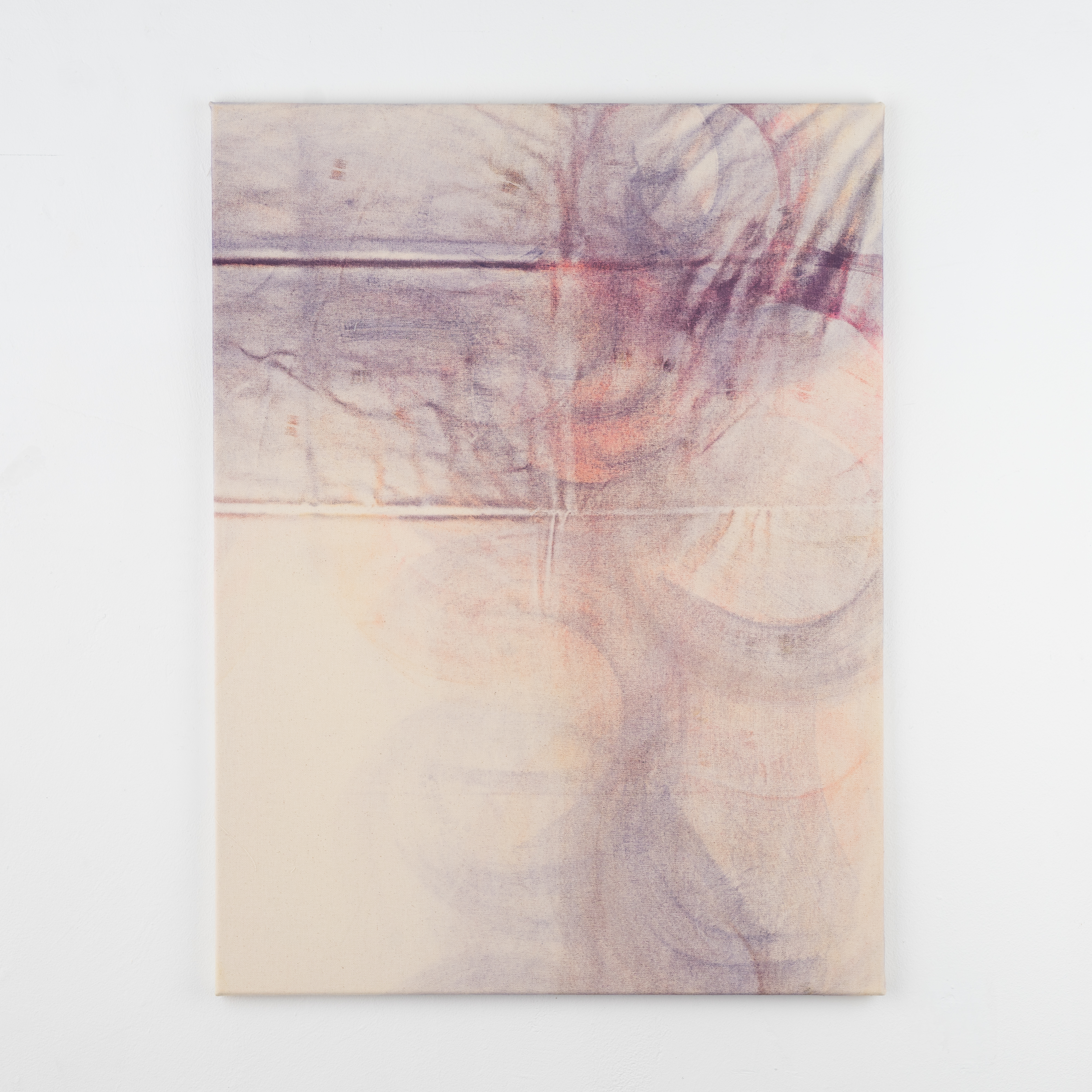
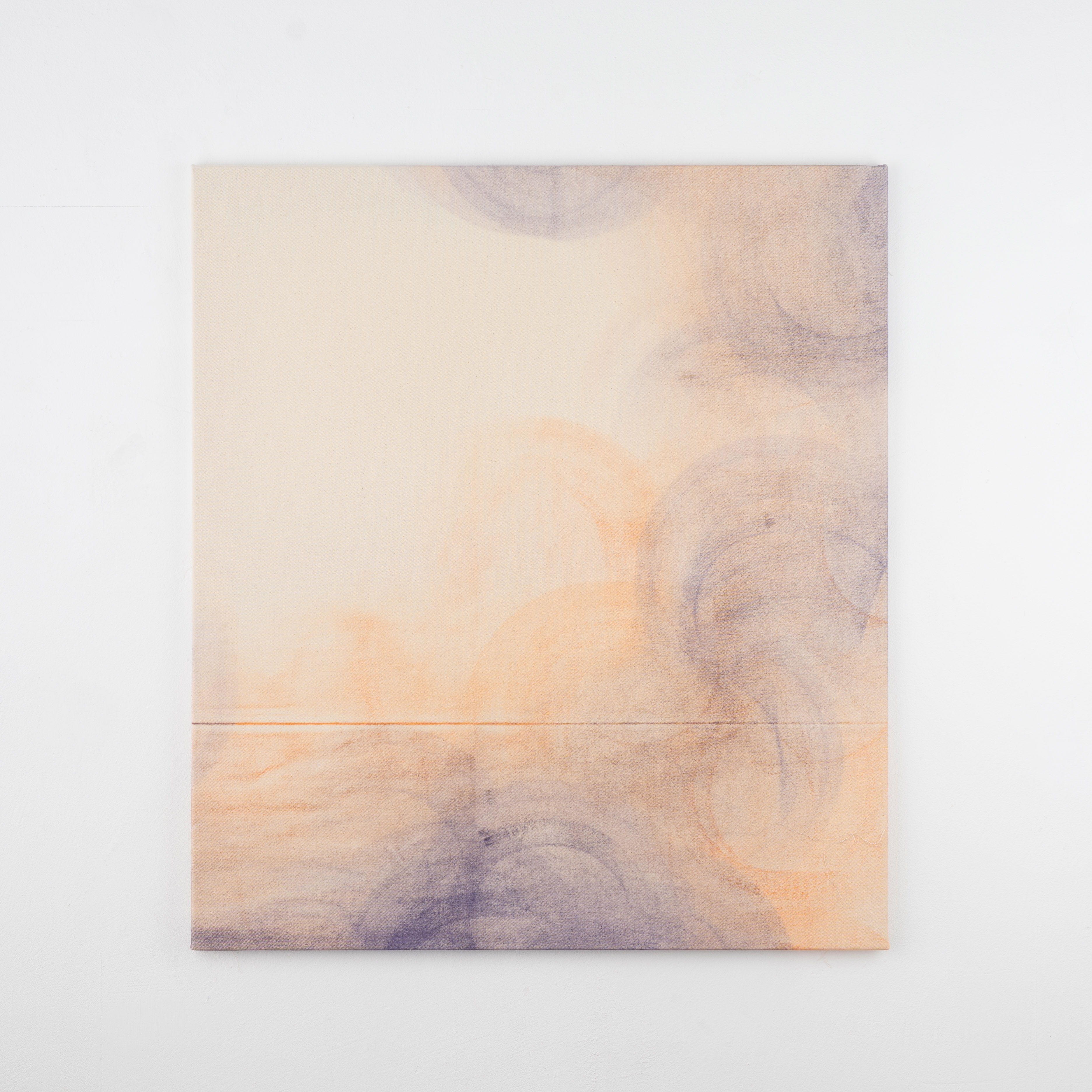

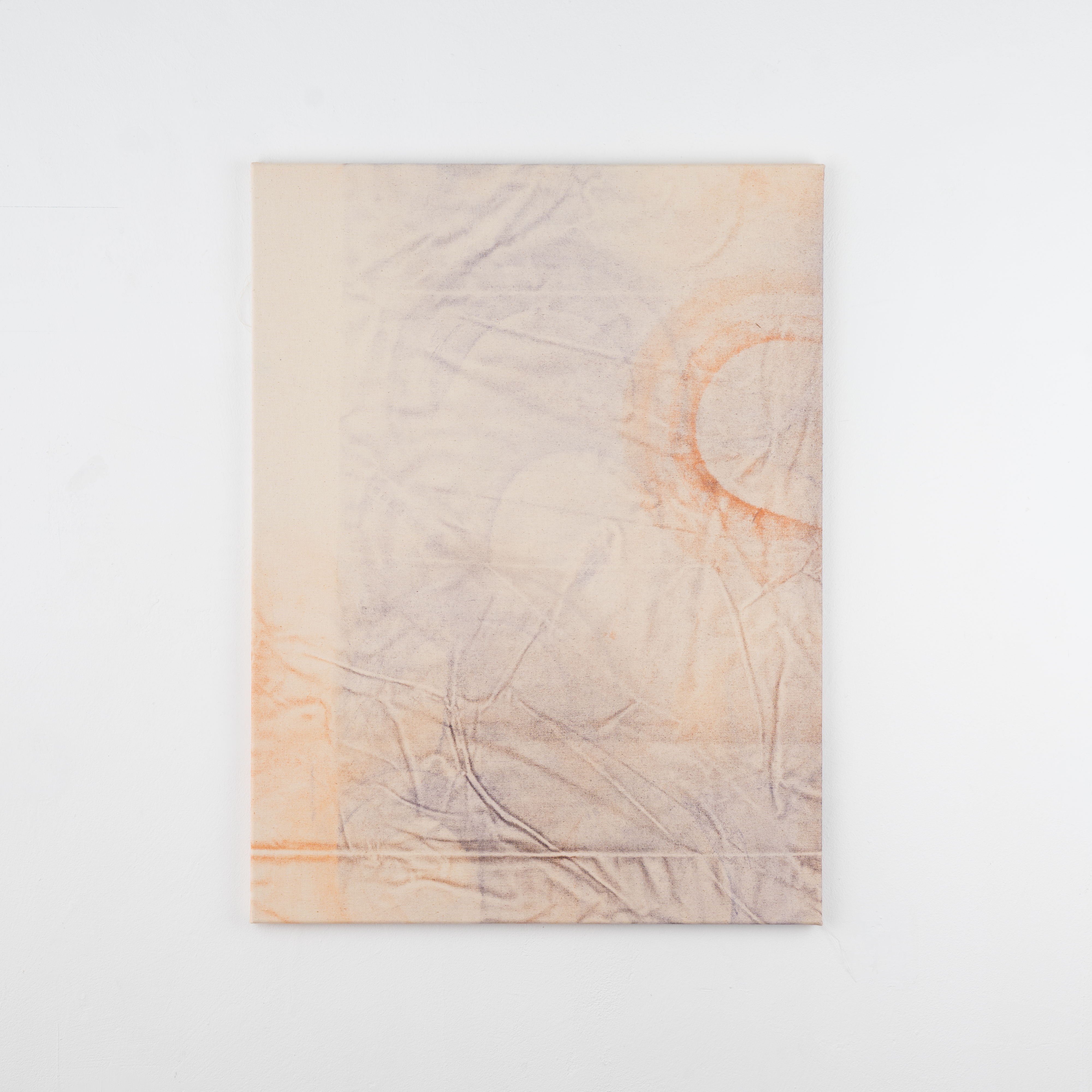
Florian Meisenberg
Exclusiv (M05)
Tusche auf Leinwand
60 x 80 cm
sold
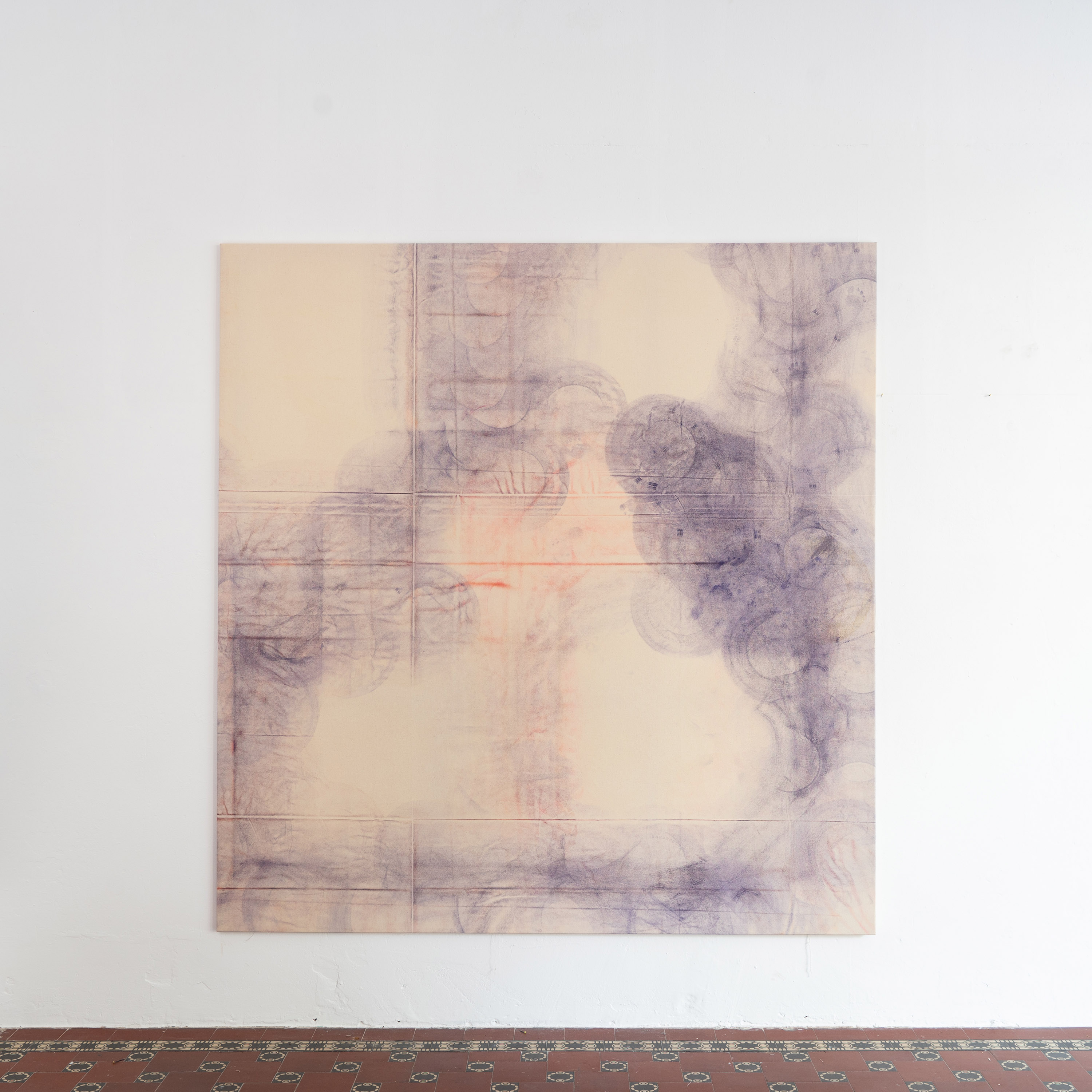
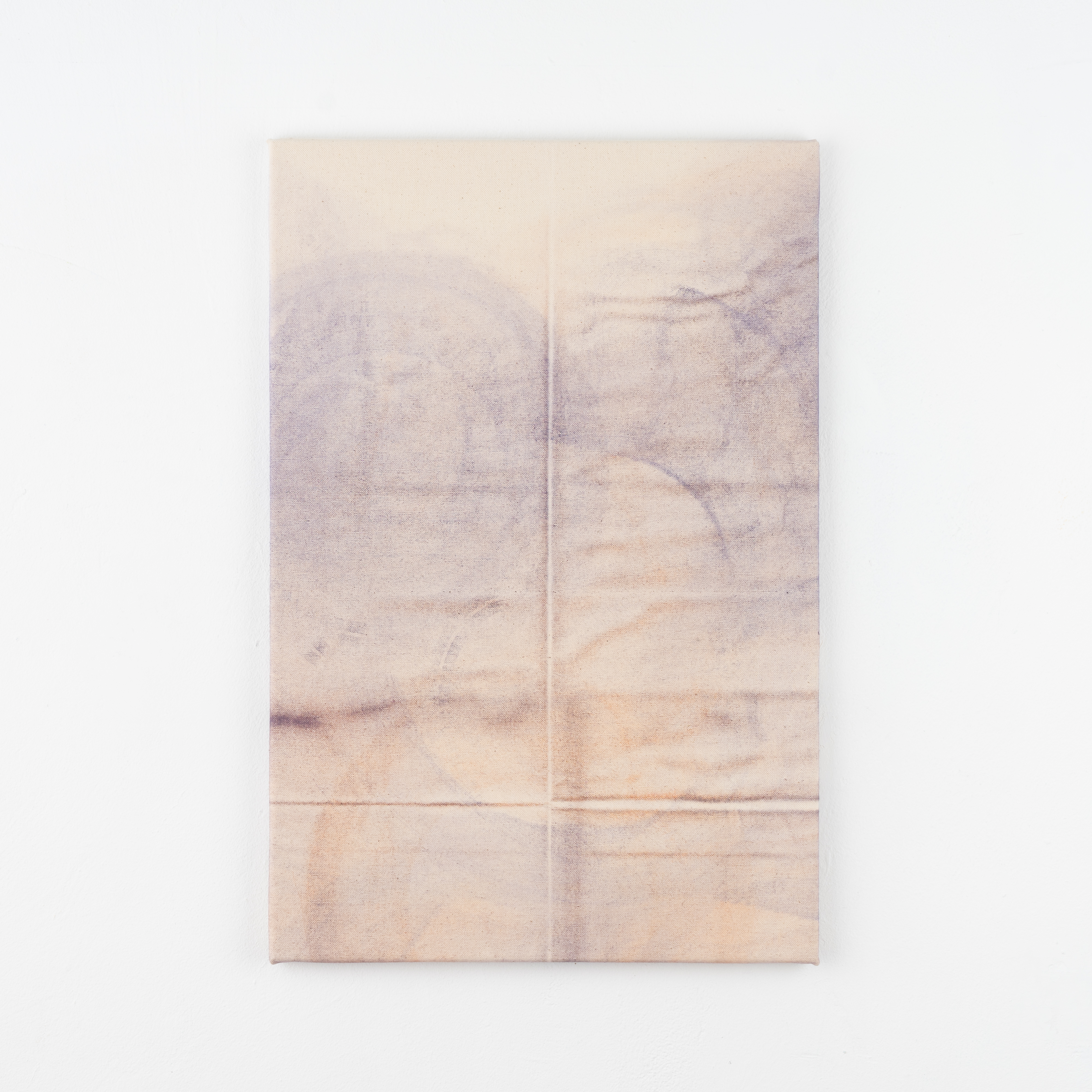
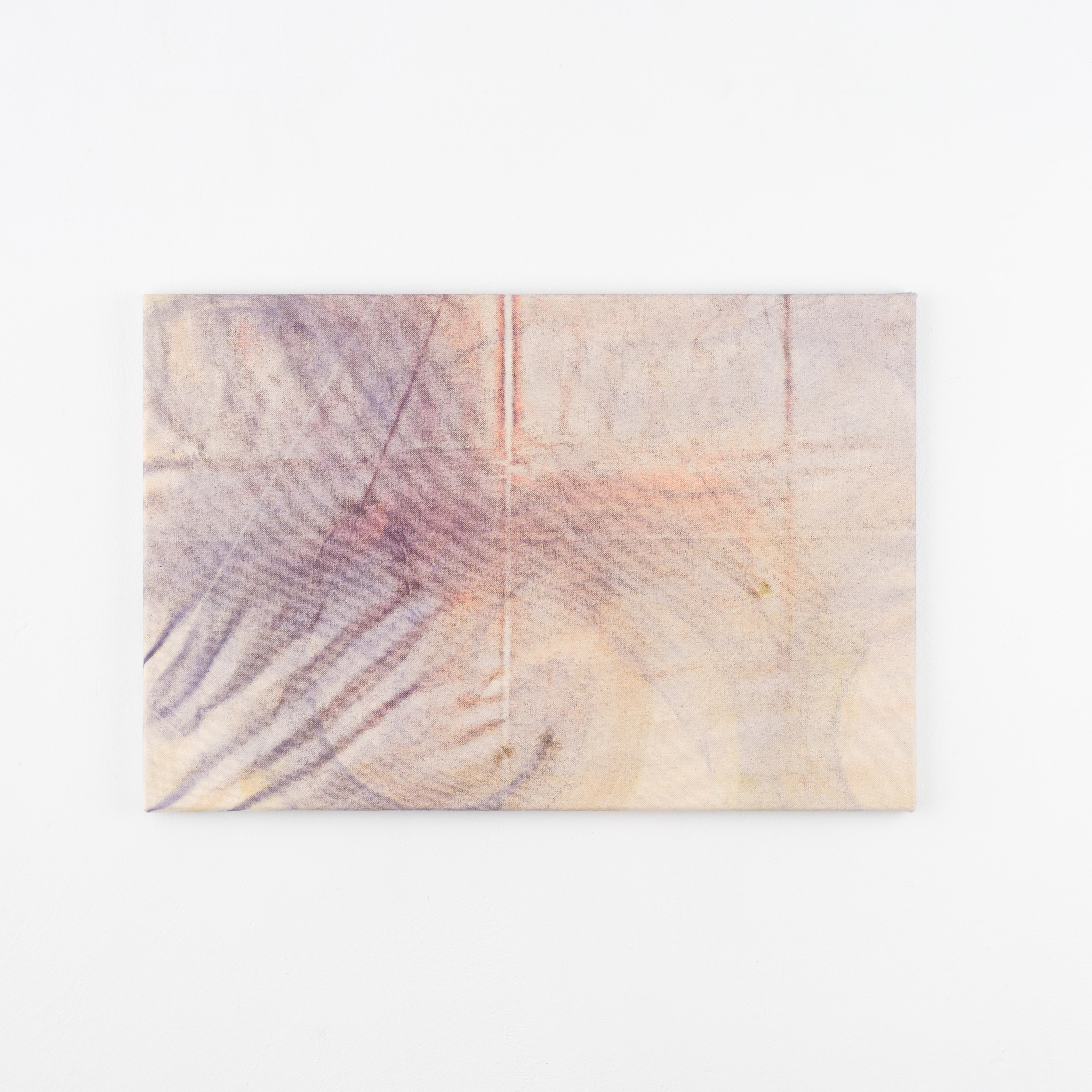
Florian Meisenberg
Exclusiv (S09)
Tusche auf Leinwand
60 x 40 cm
sold

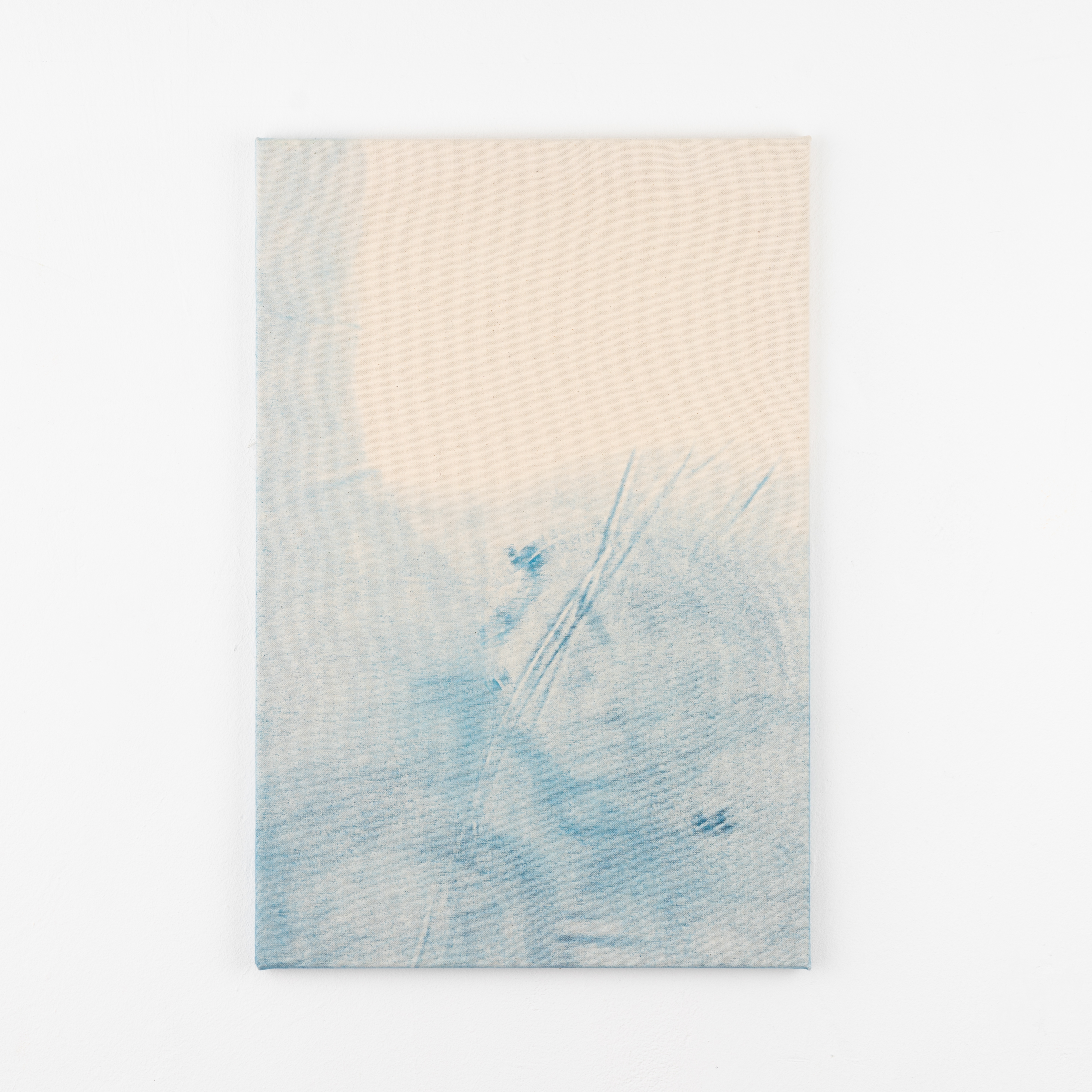
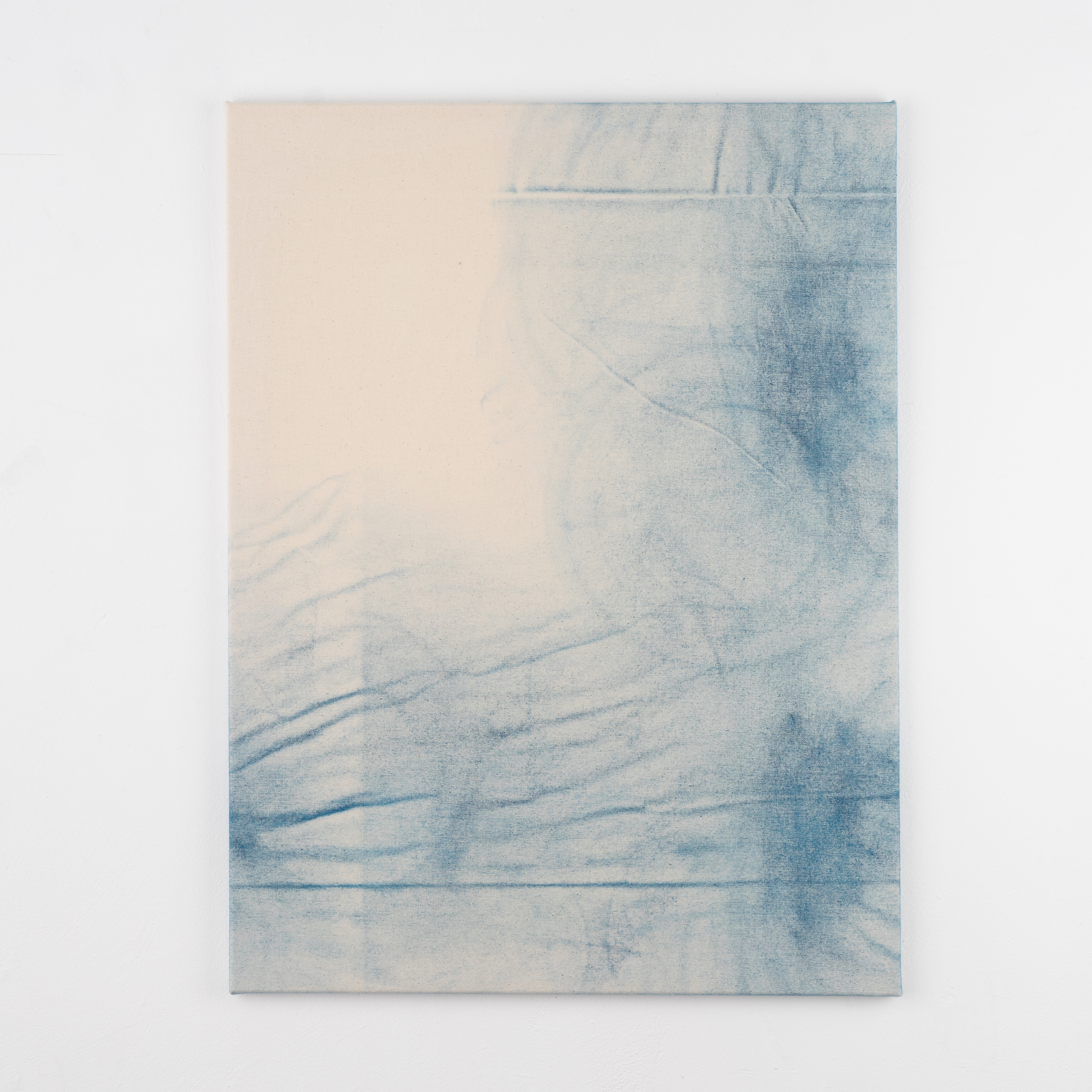
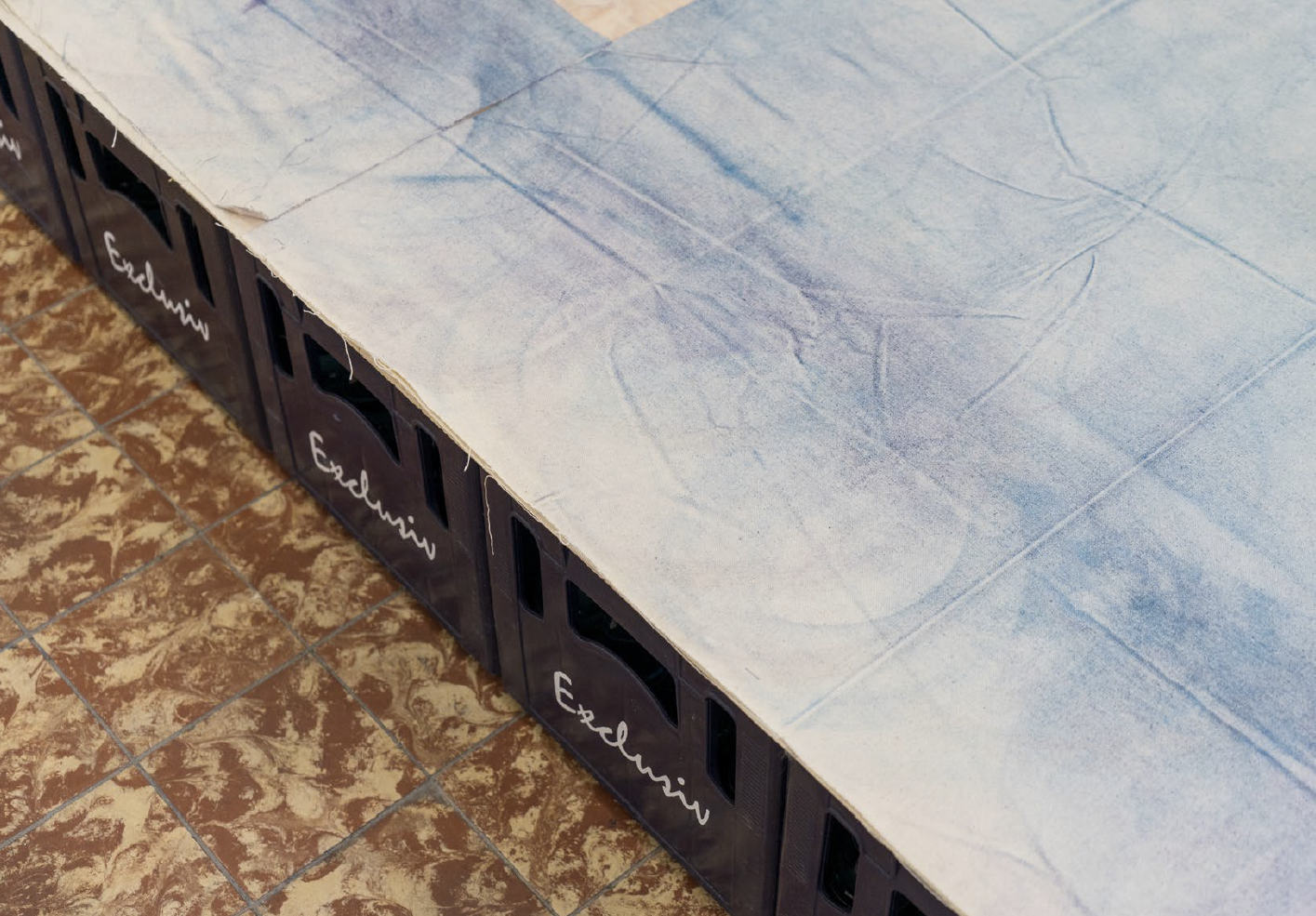

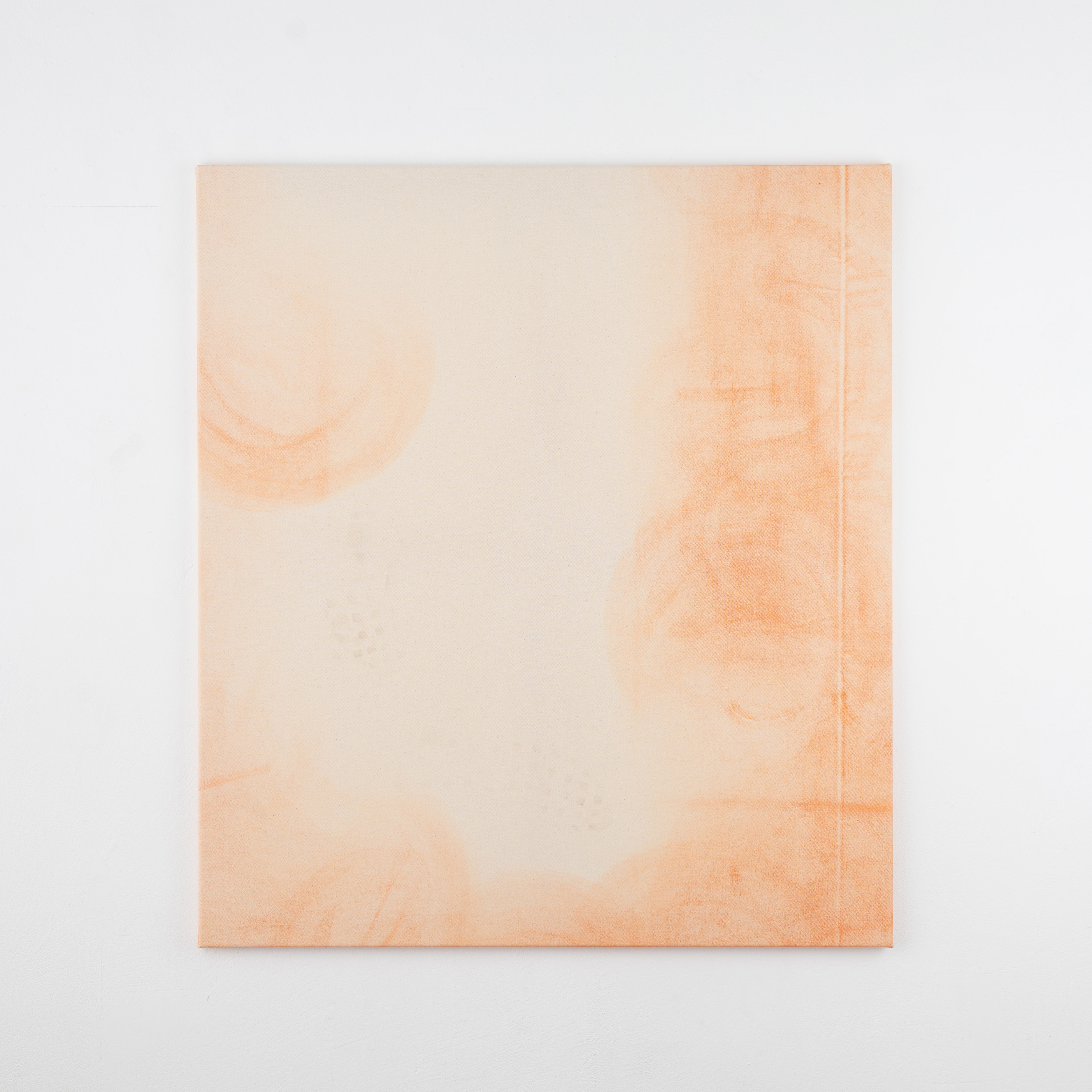
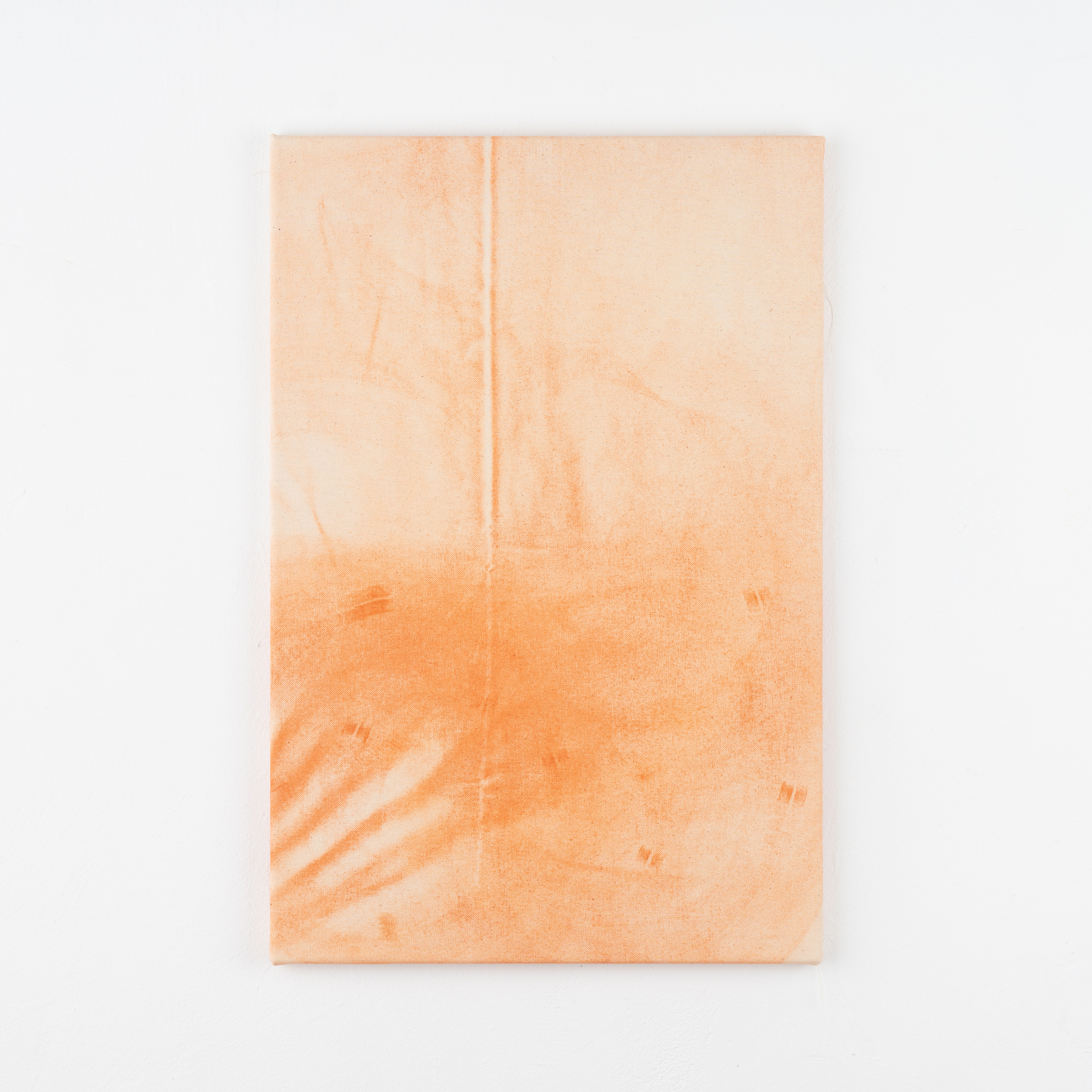
Florian Meisenberg
Exclusiv (S05)
Tusche auf Leinwand
60 x 40 cm
sold
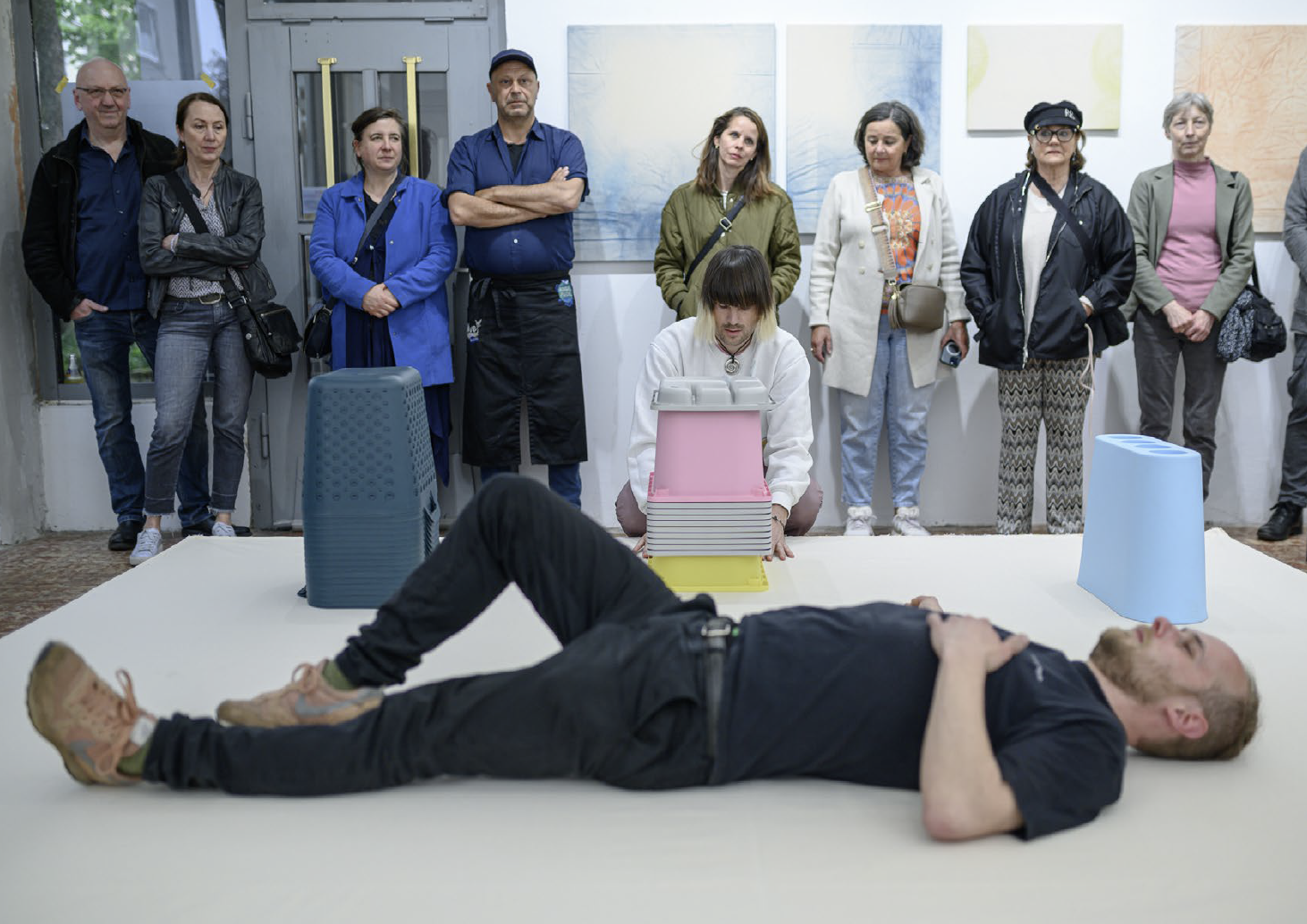
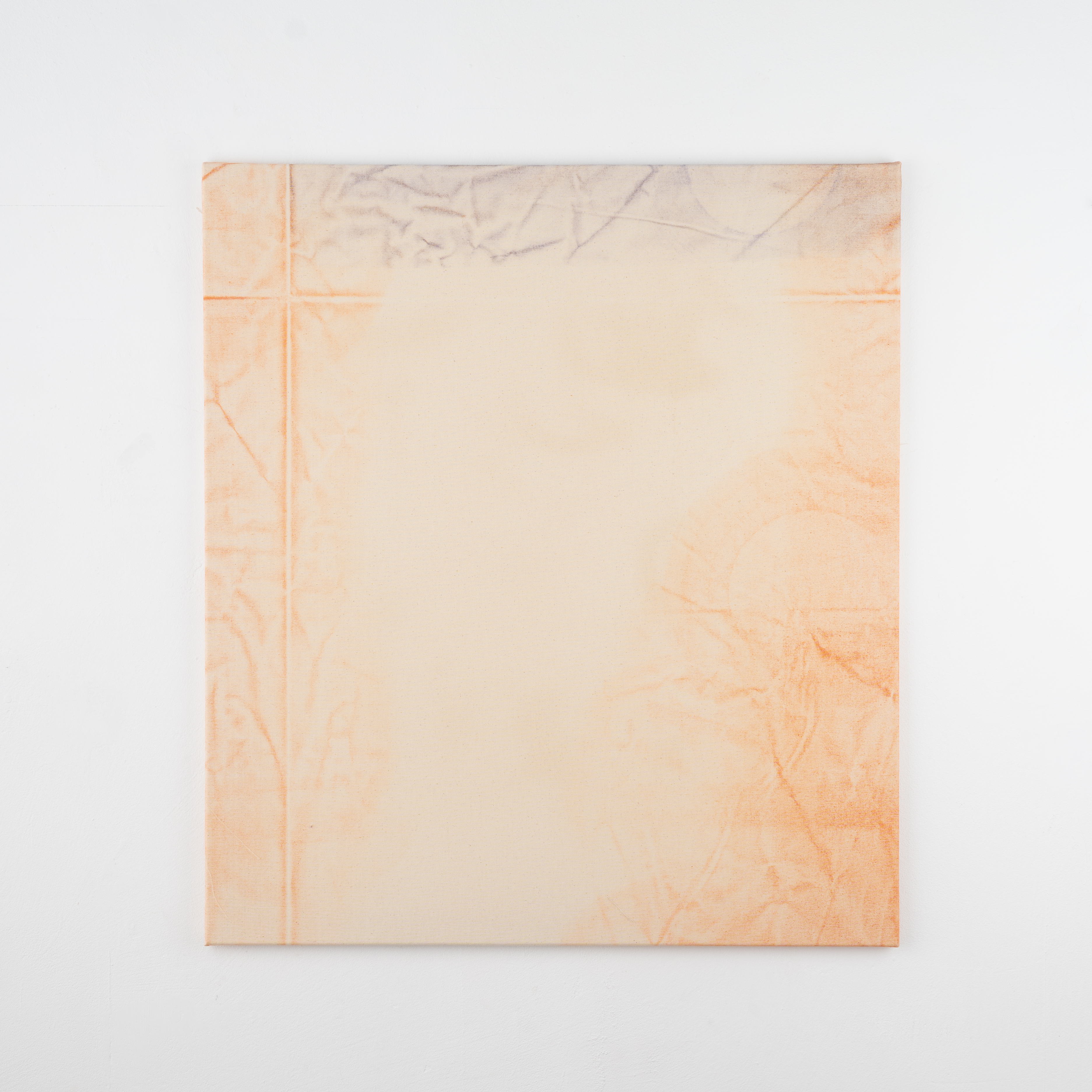
Florian Meisenberg
Exclusiv (L04)
Tusche auf Leinwand
90 x 80 cm
sold

Florian Meisenberg
Exclusiv (S04)
Tusche auf Leinwand
60 x 40 cm
reserved
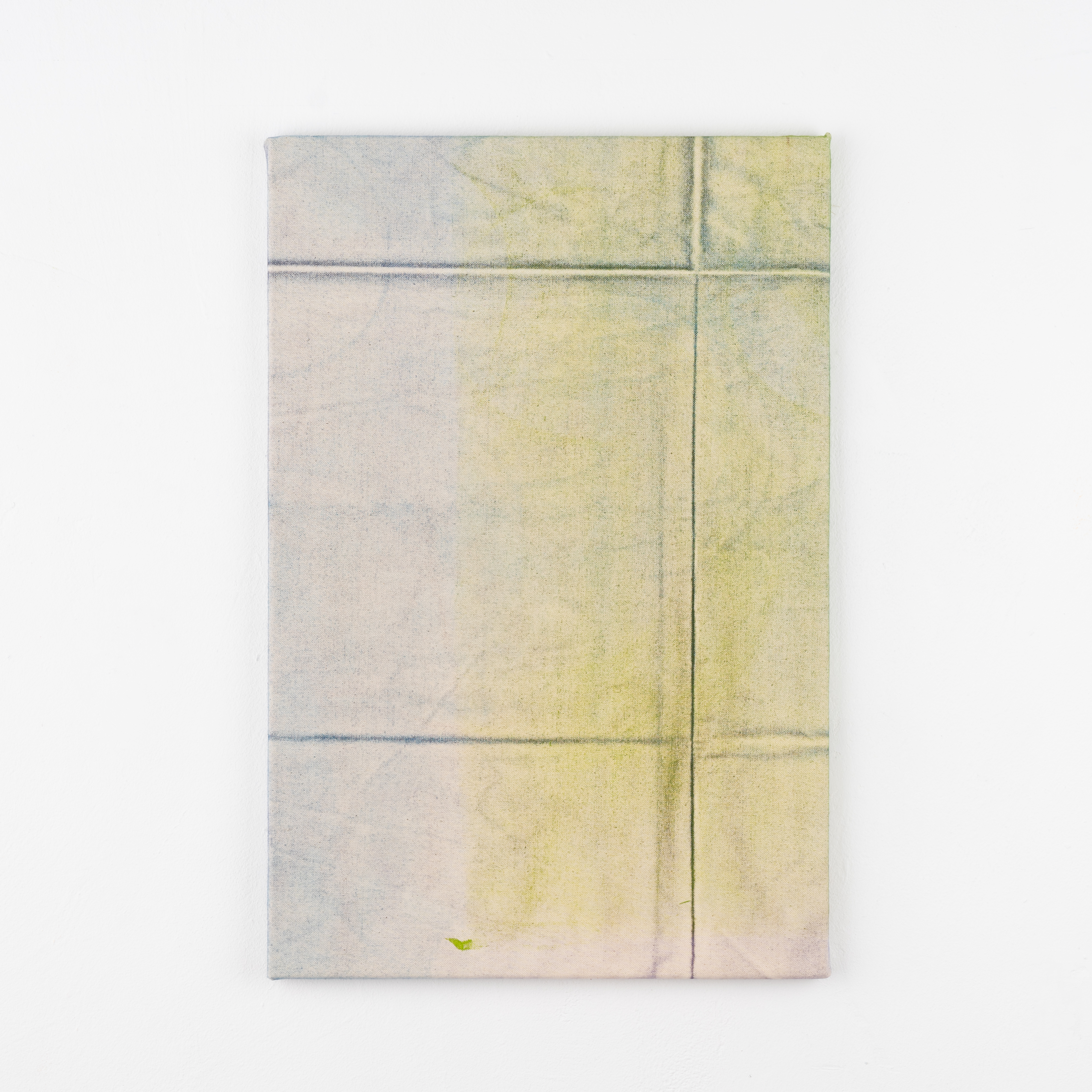

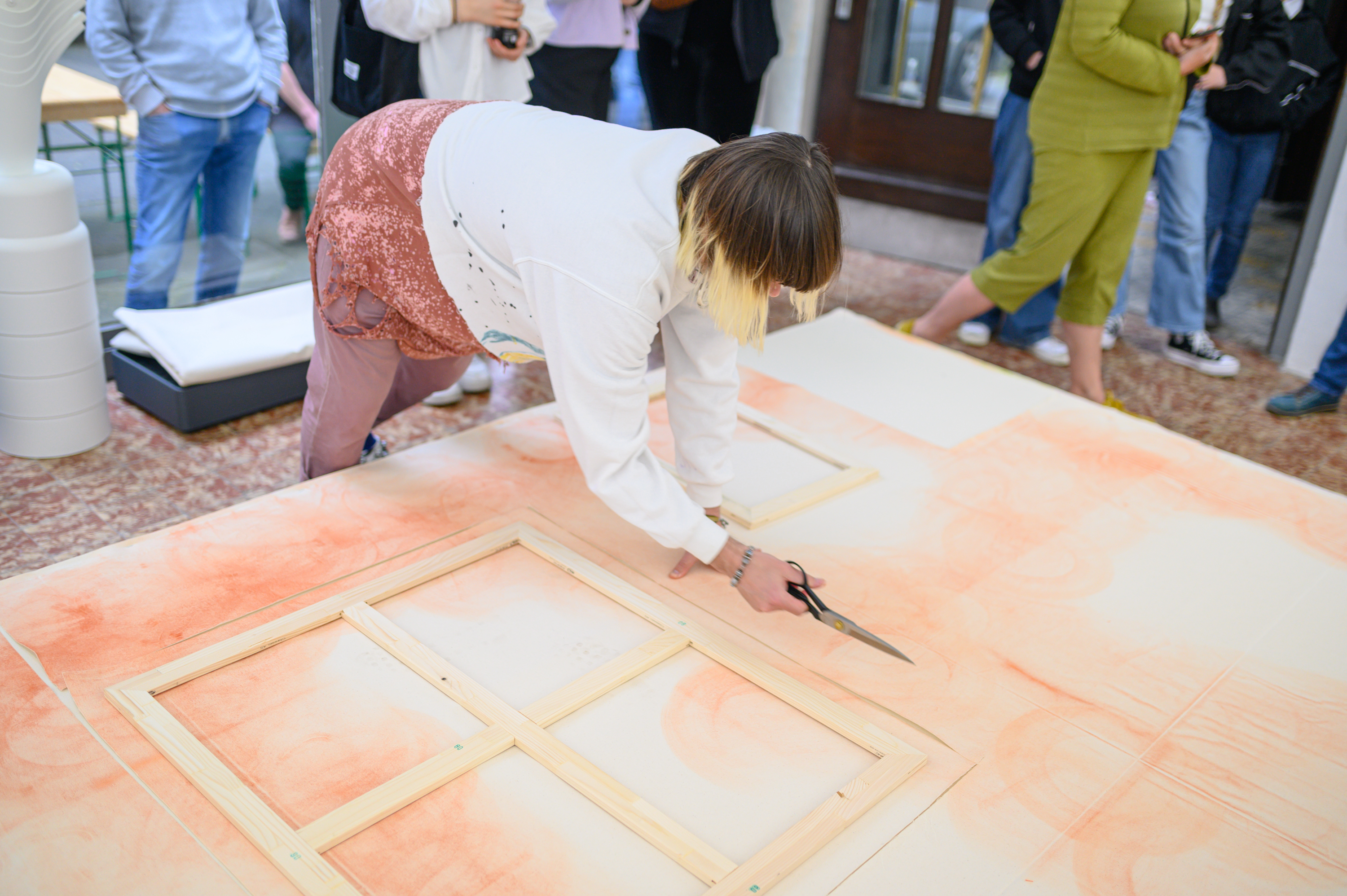



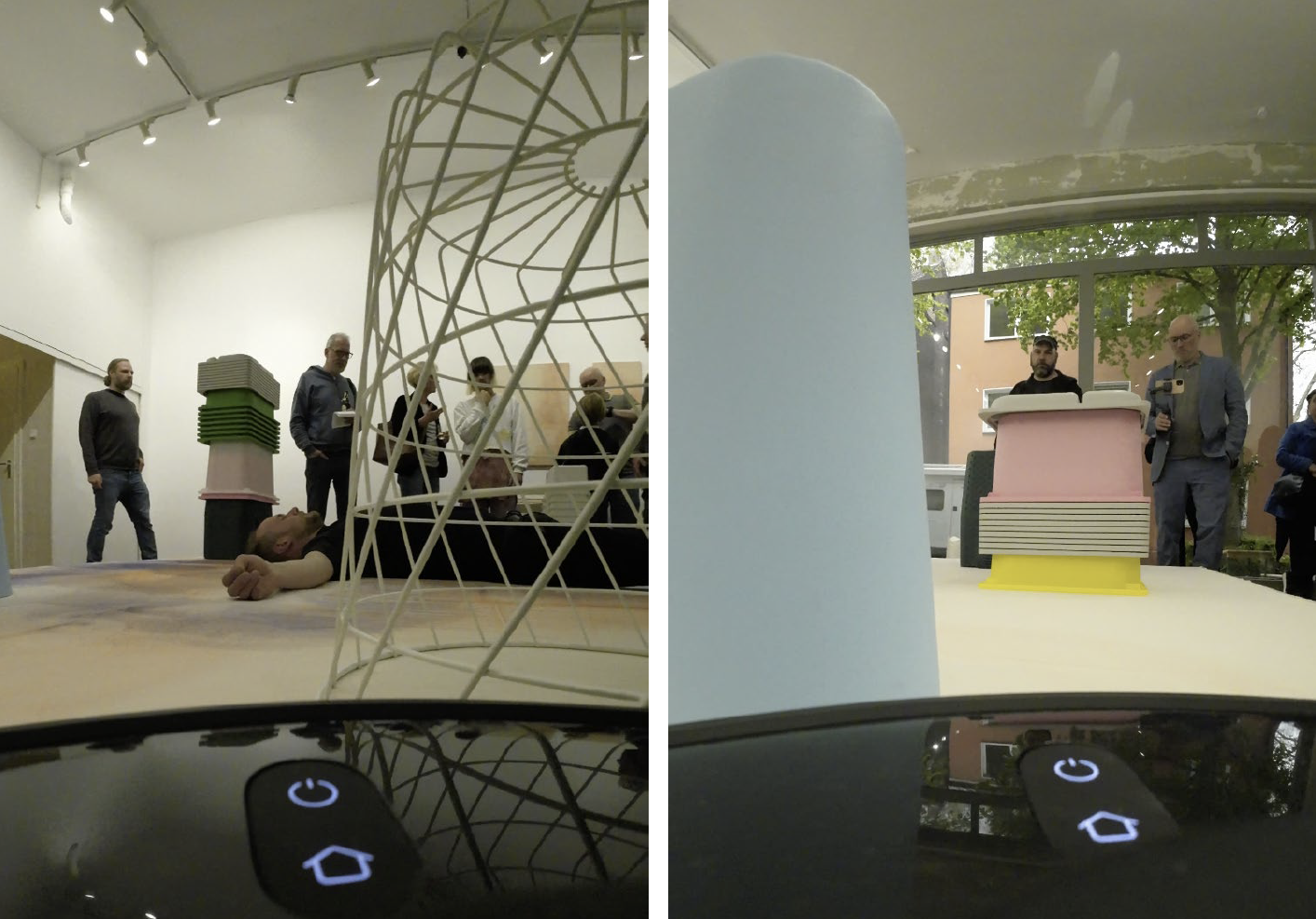
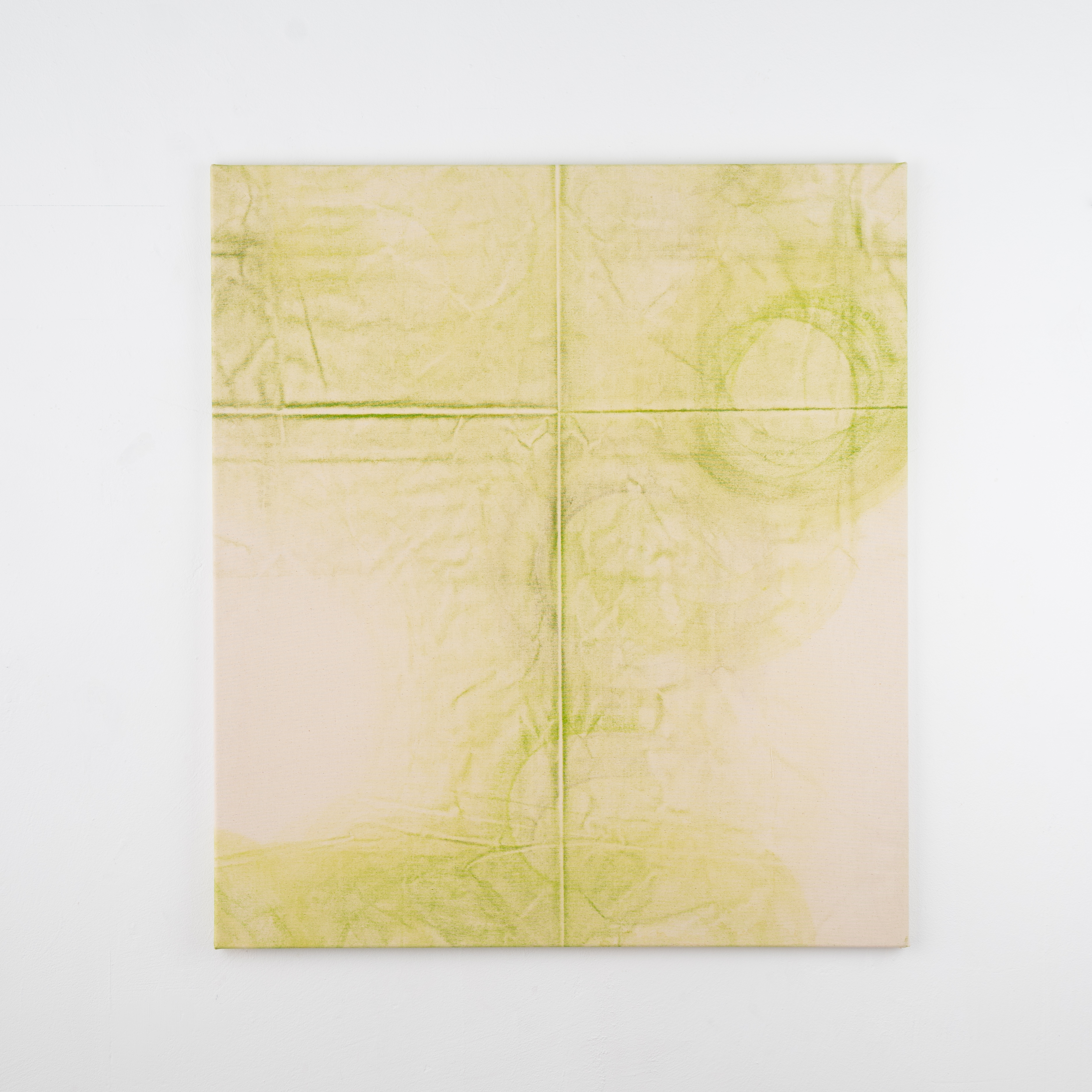
Florian Meisenberg
Exclusiv (M04)
Tusche auf Leinwand
60 x 80 cm
sold

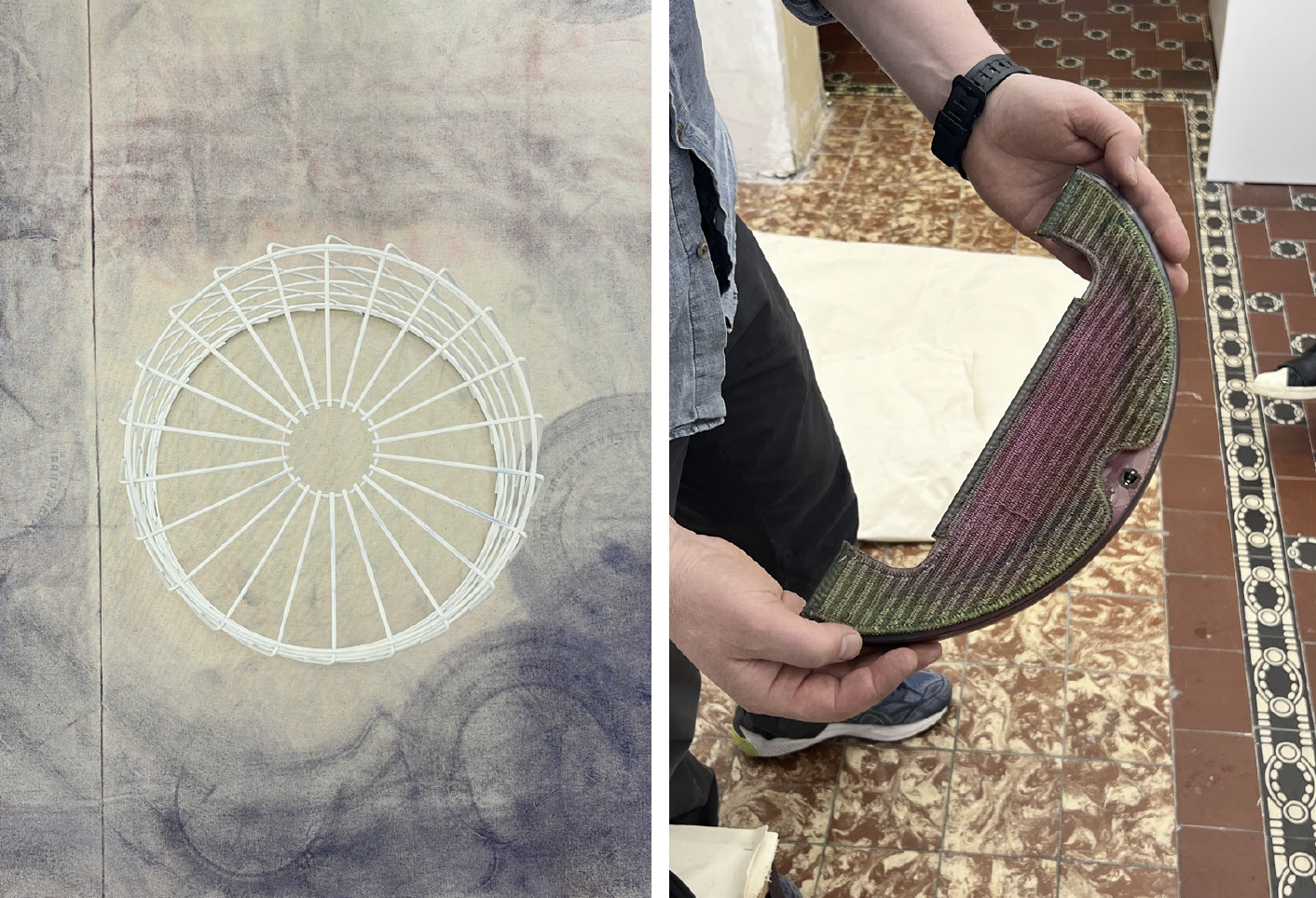
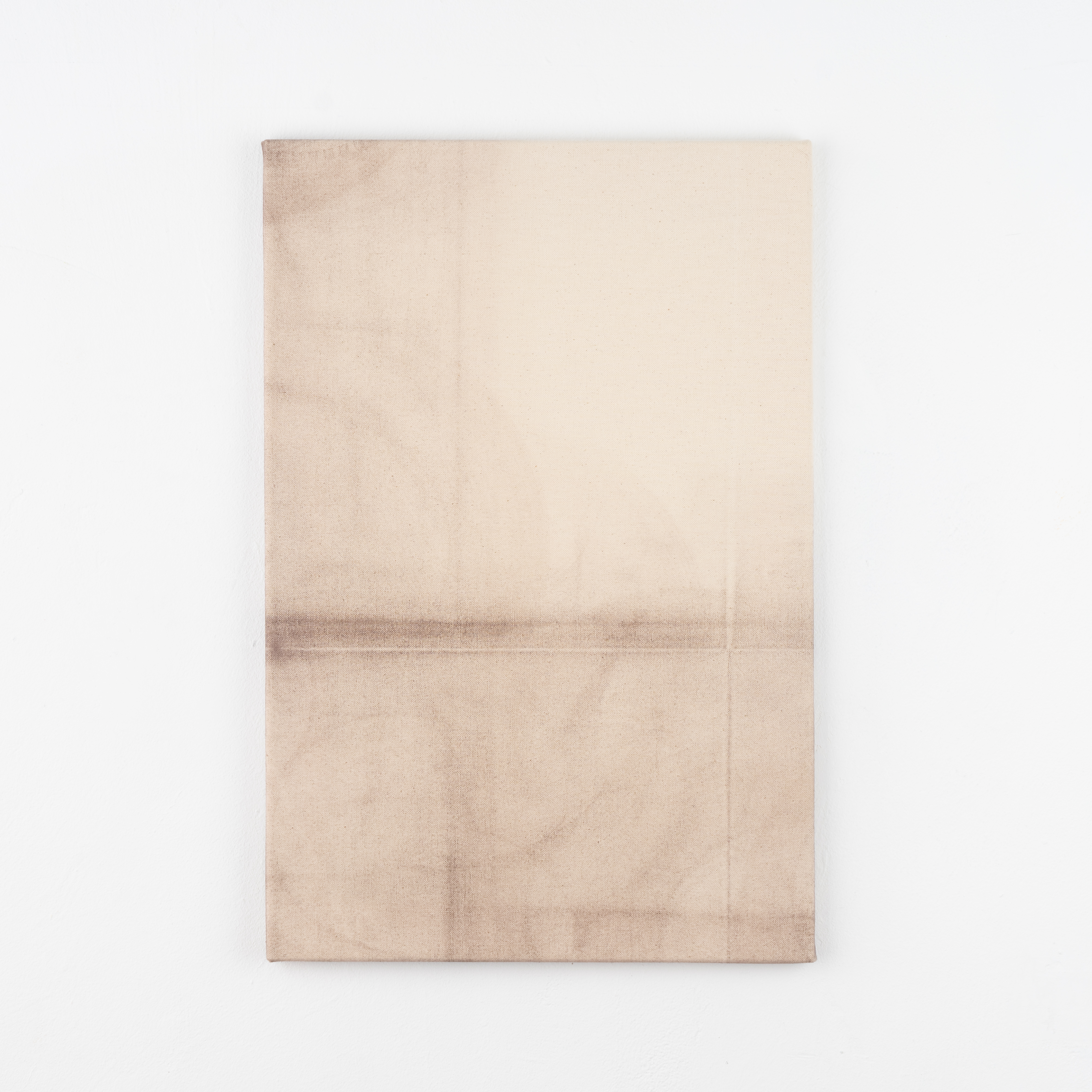
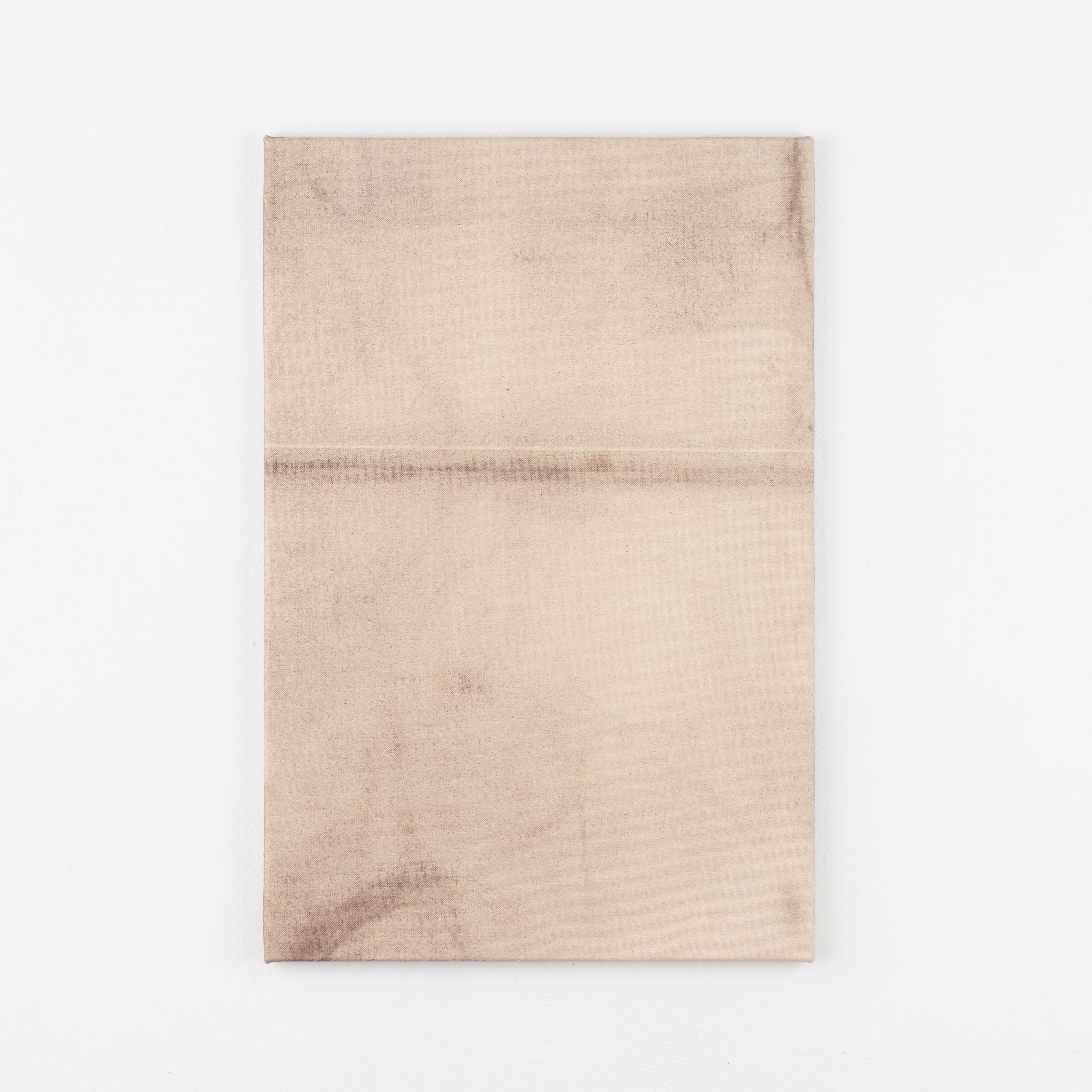
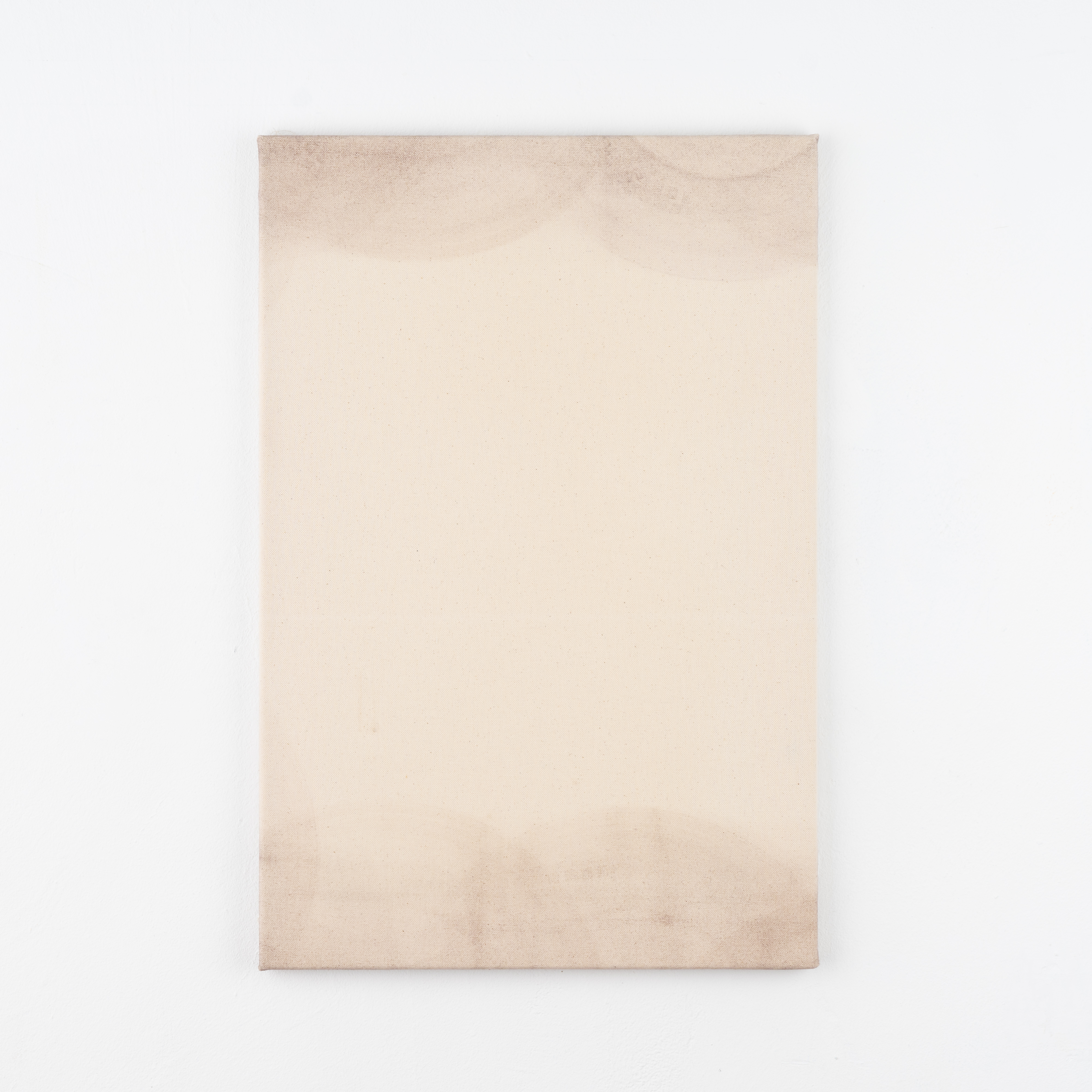
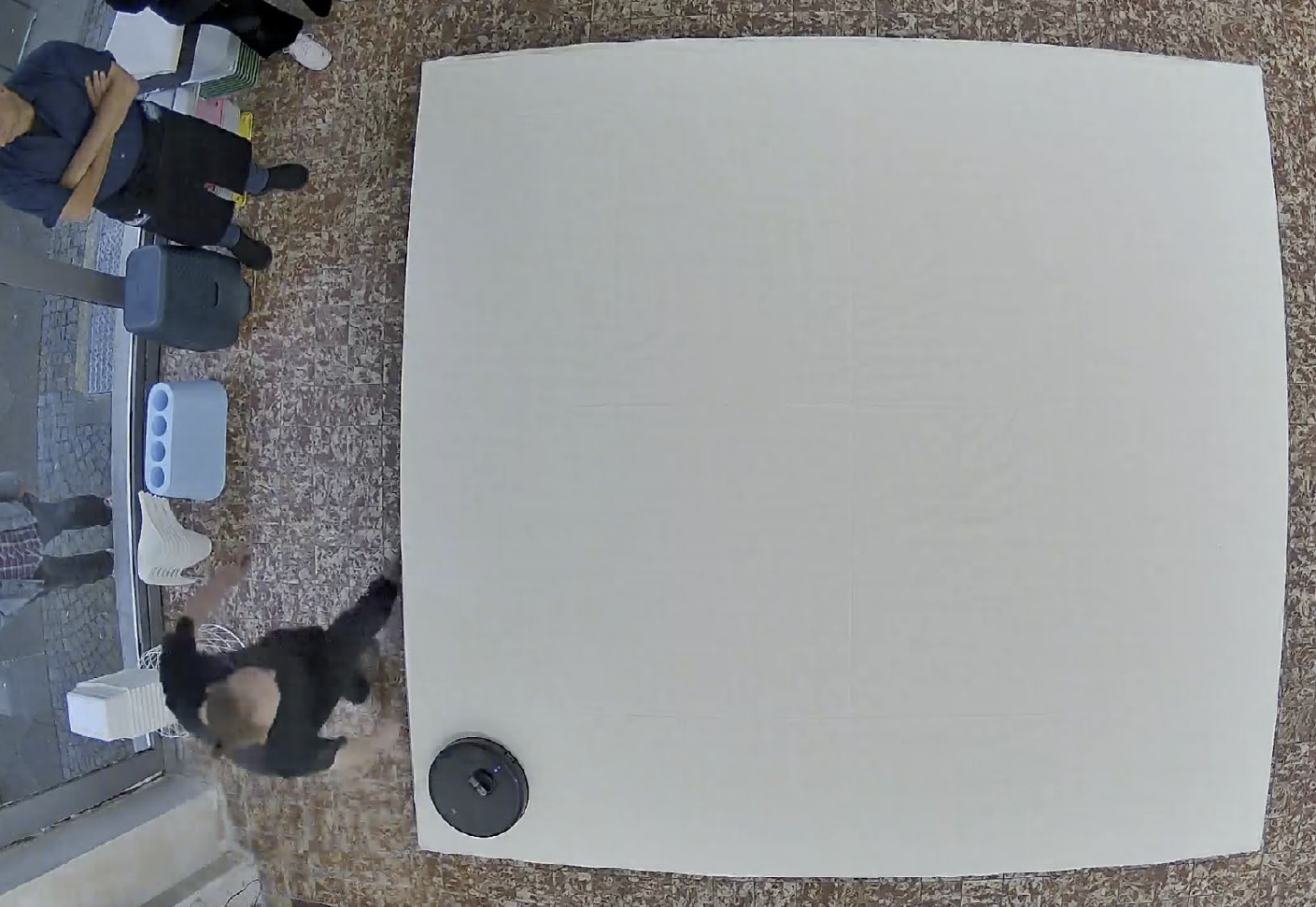
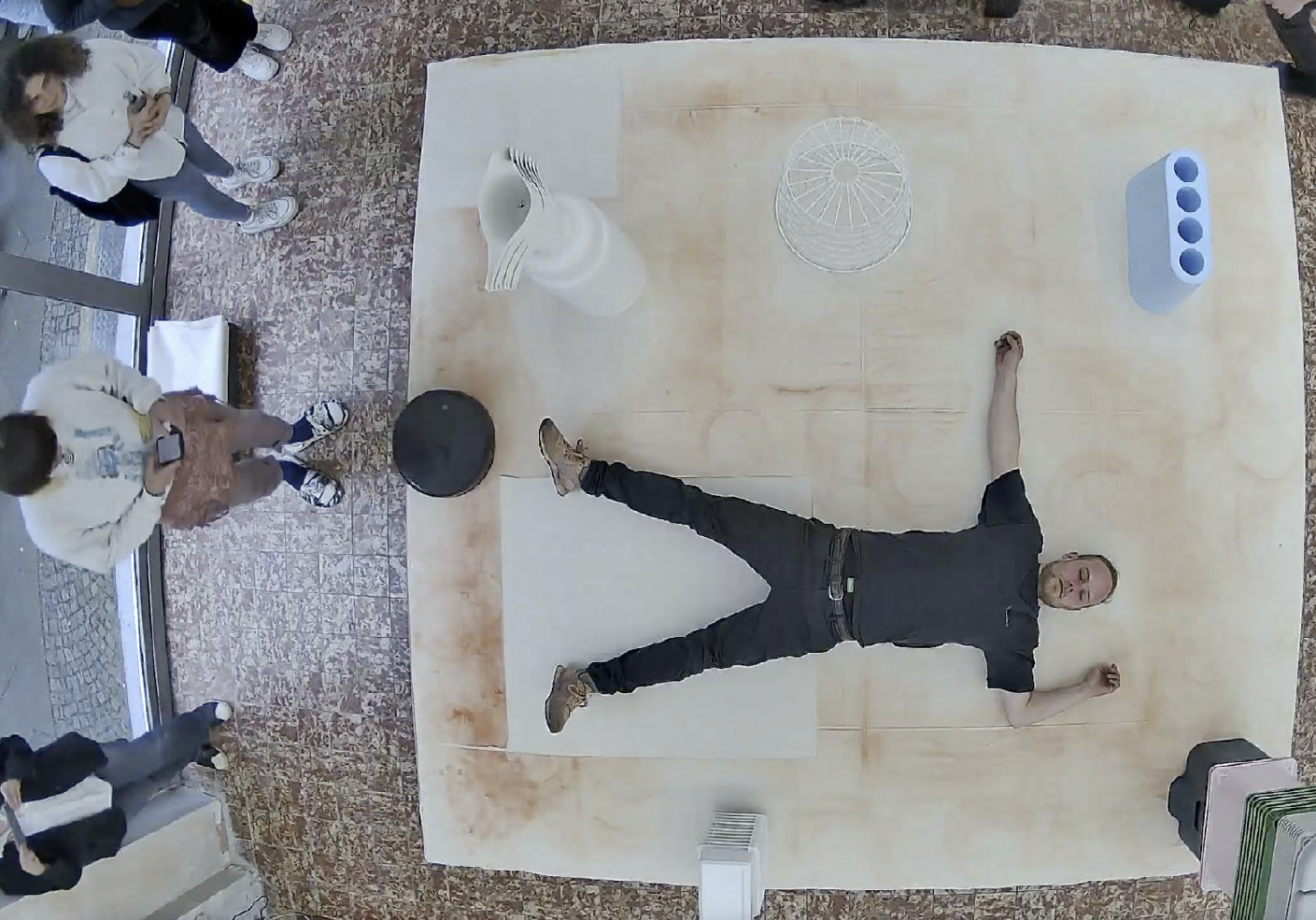
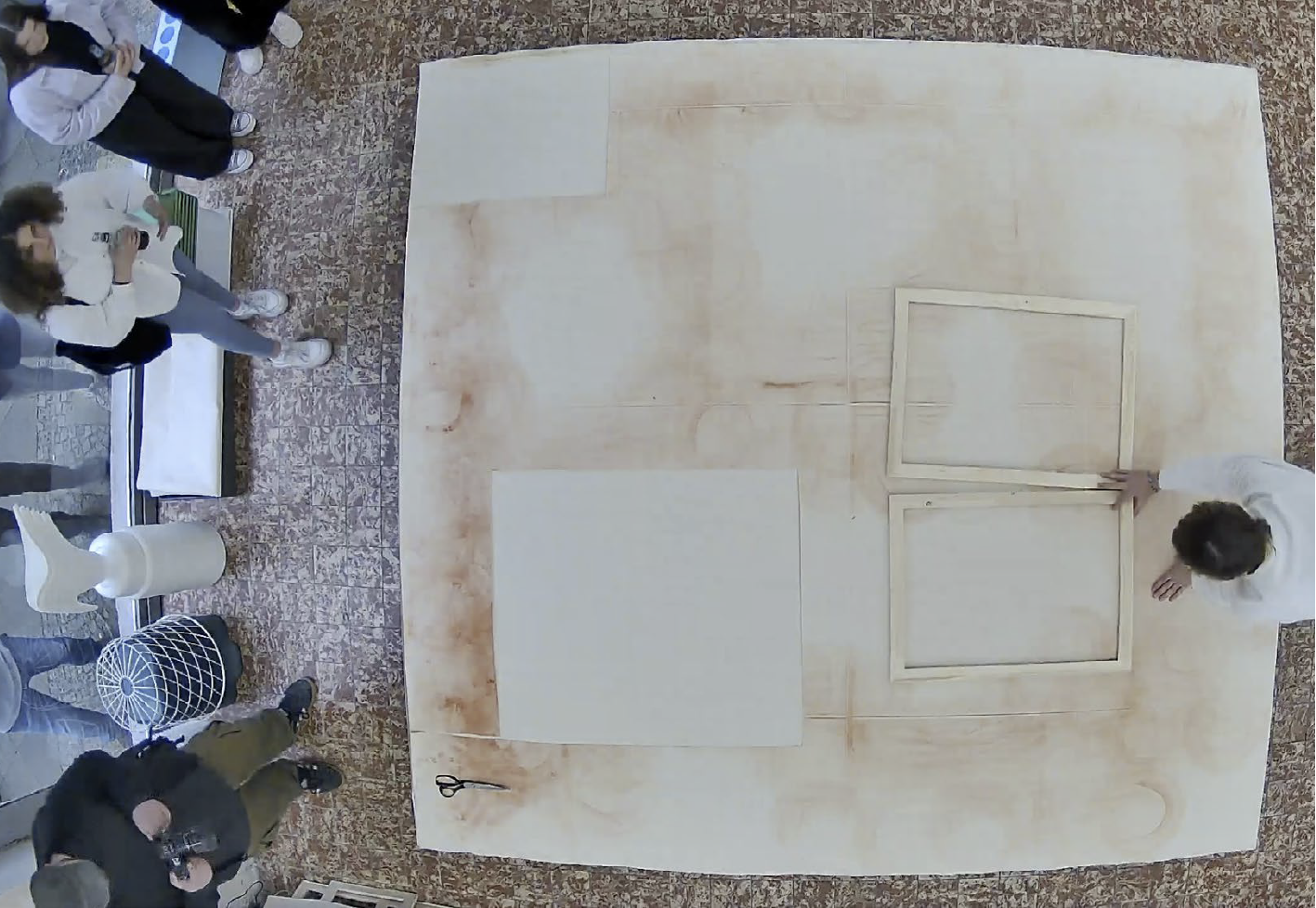

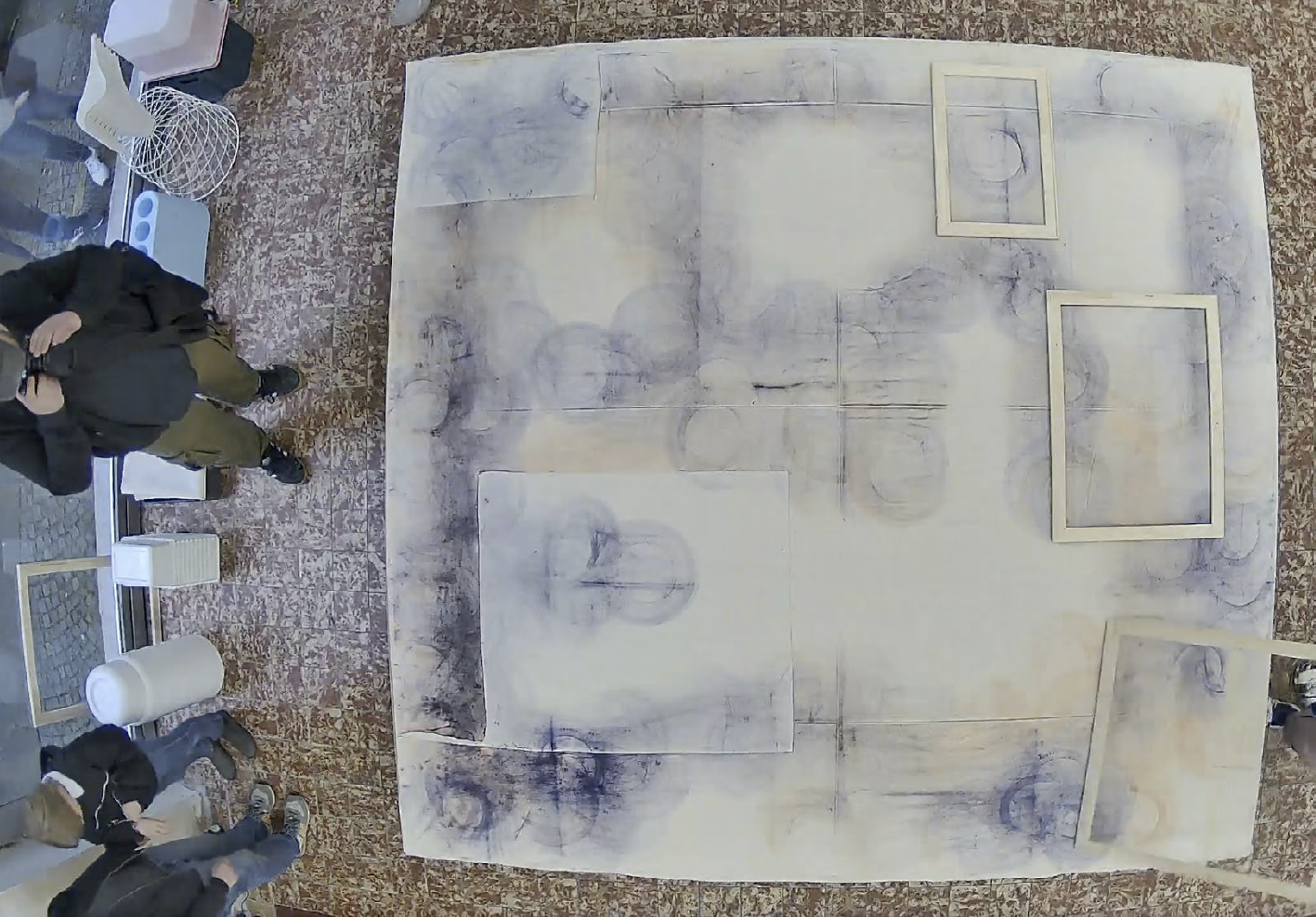

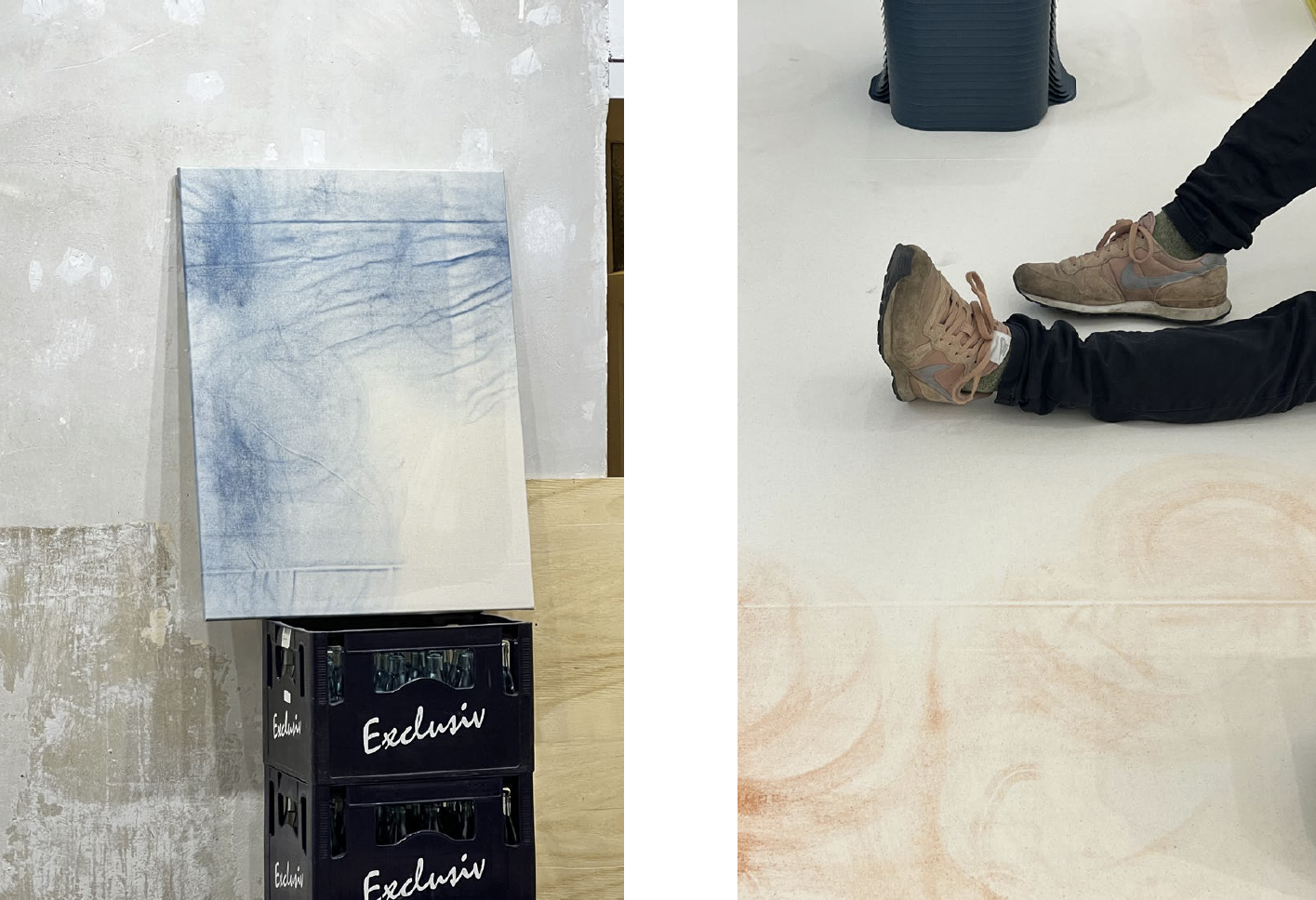
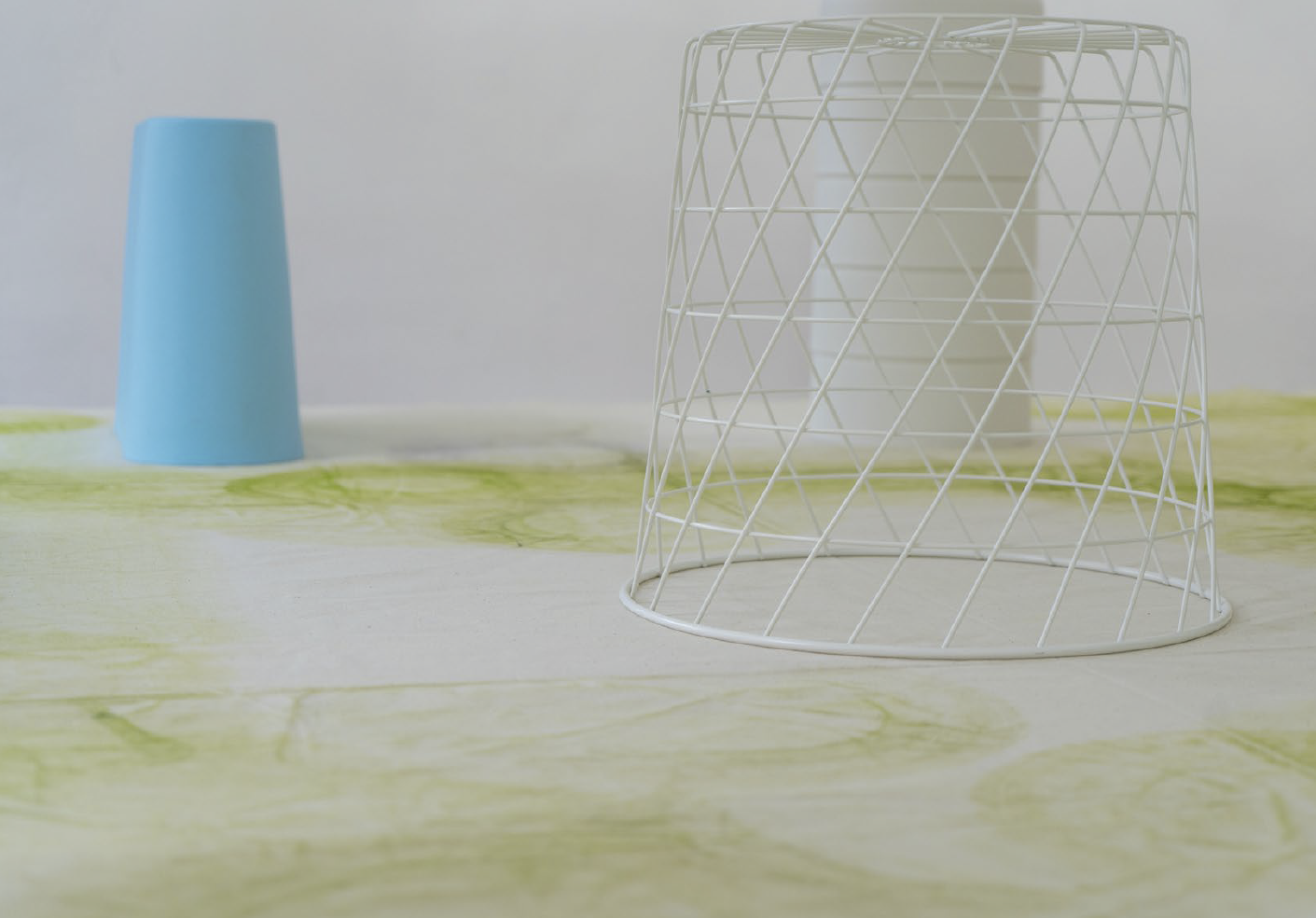

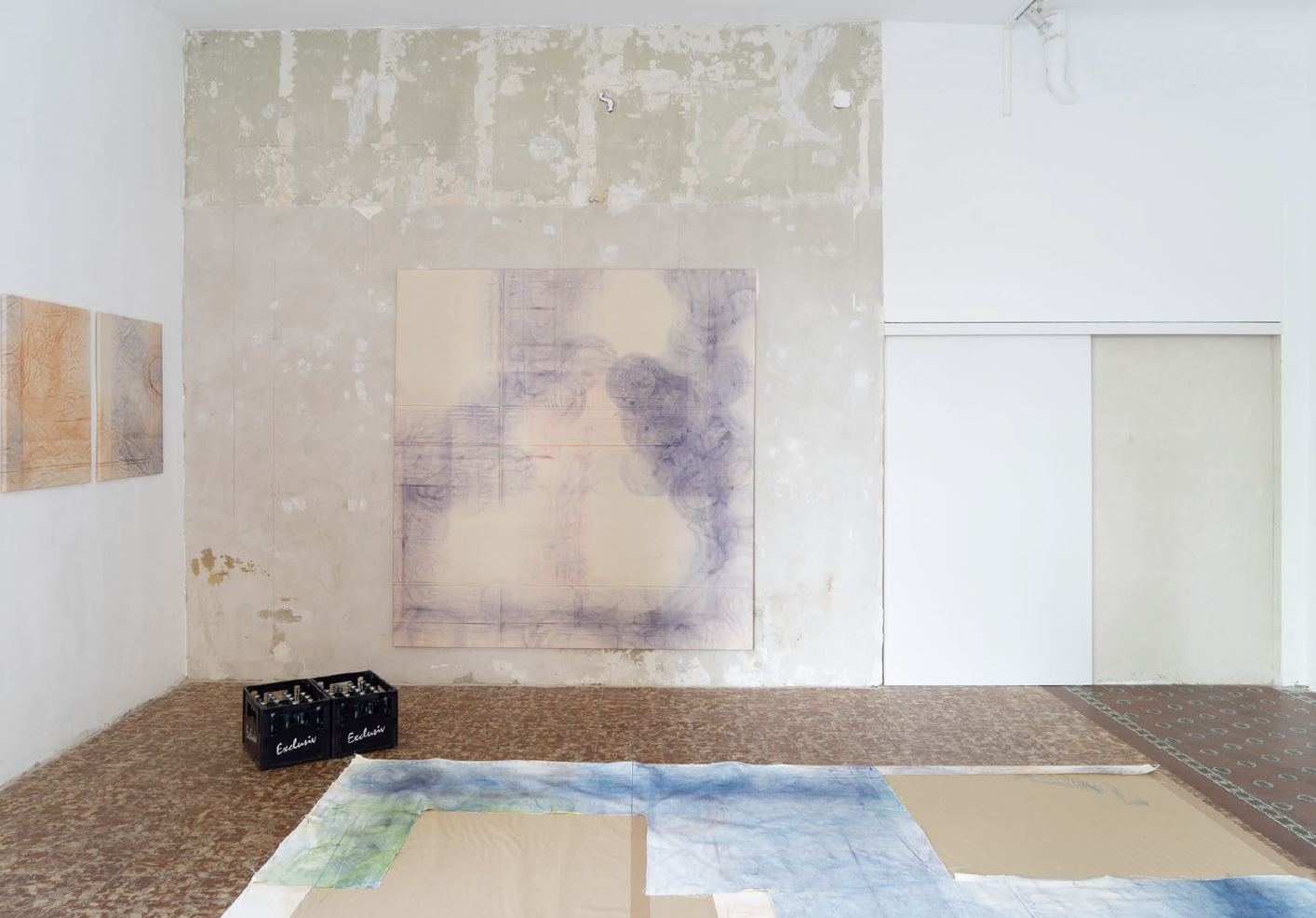
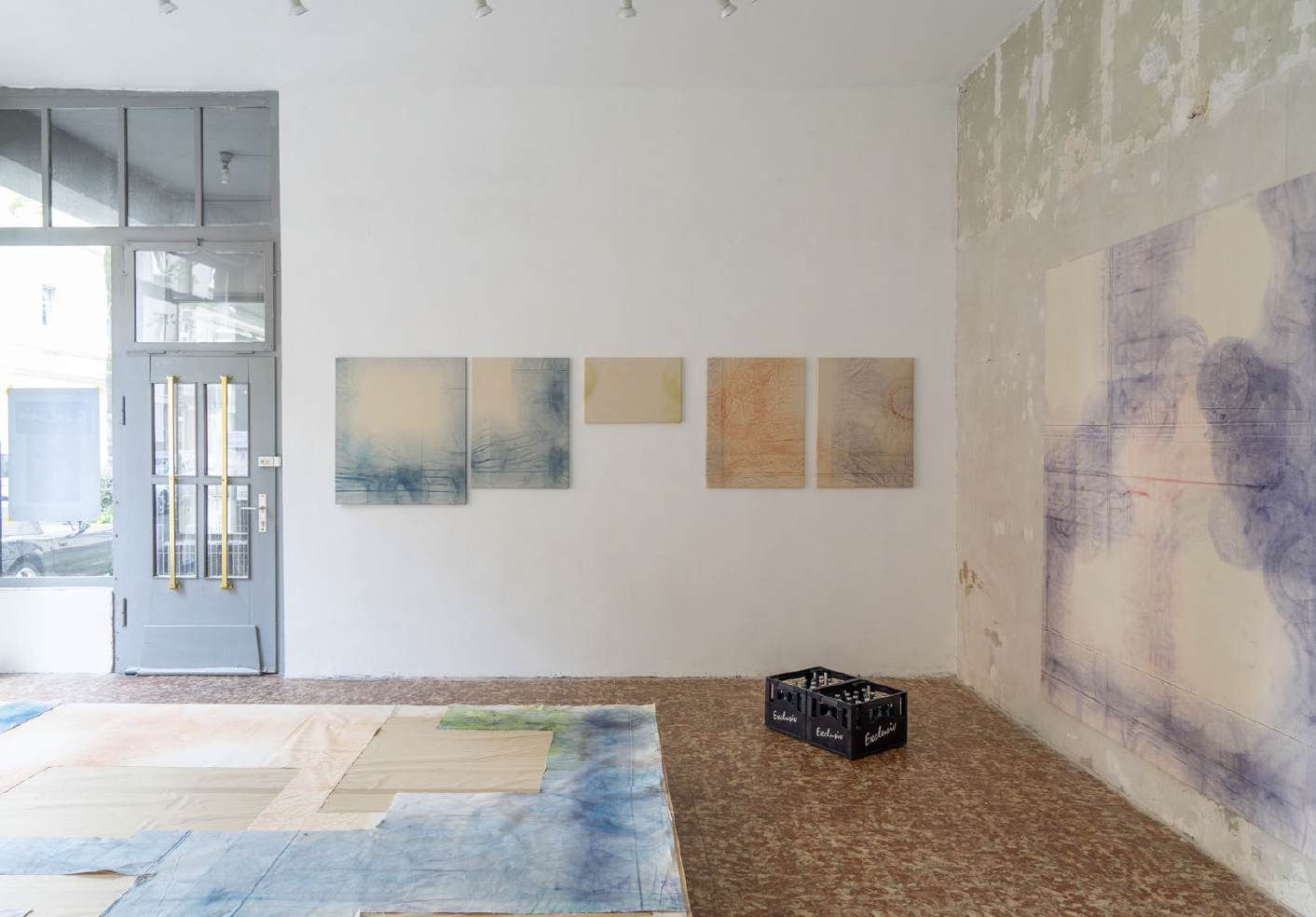
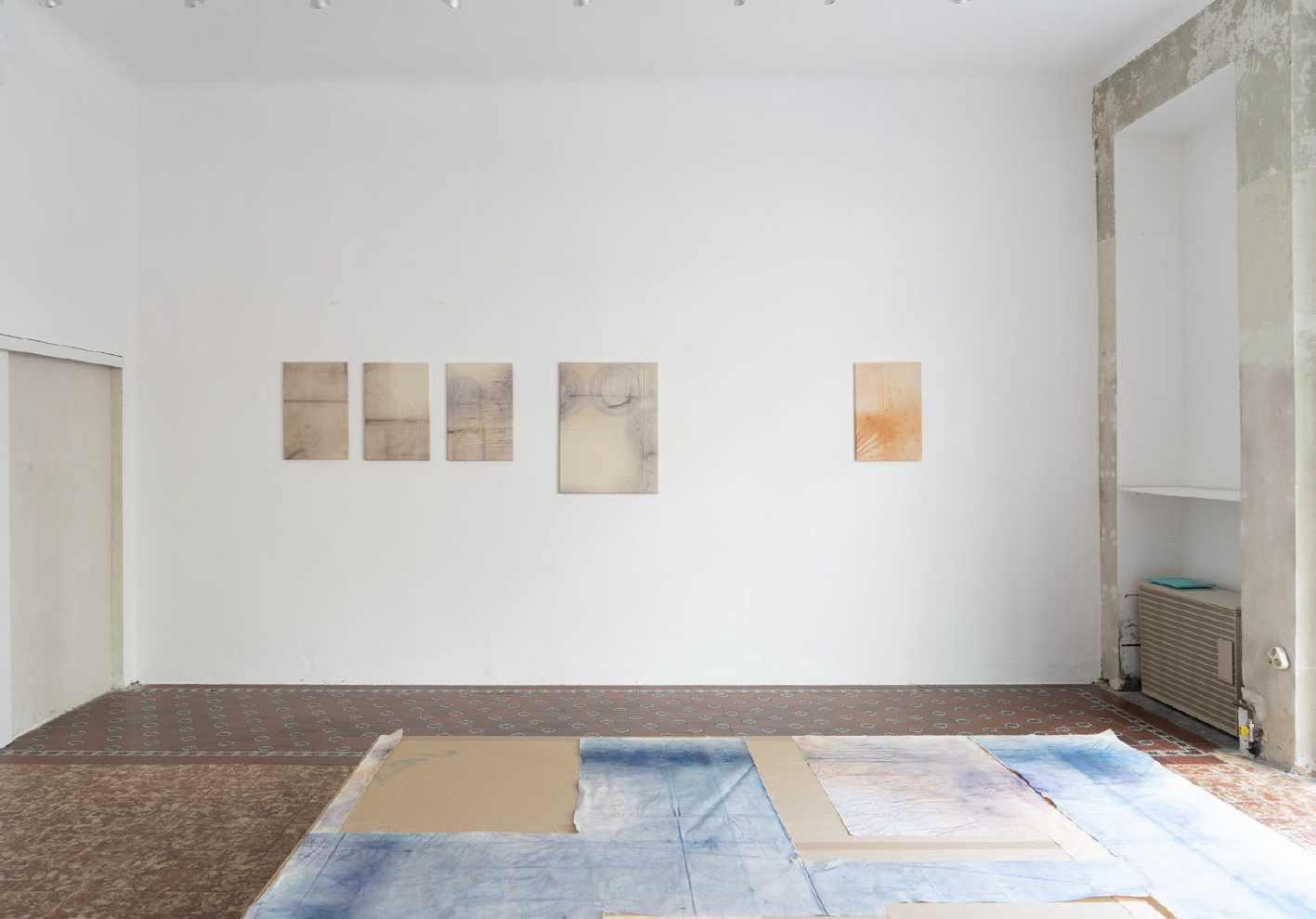

Die Freunde sitzen noch Stunden. Warten auf ein Wunder. Starren in ihre verwanzten Rechner, starren begeisterte Menschen an, die mit Fingern auf sich zeigen, sich anstoßen, kichern, oder einfach uninteressiert weitergehen. Sie fühlen. Nichts. Der Schock stellt ein kaltes Rauschen in den Körpern her – unfähig zu analysieren, was genau schiefgegangen ist bei ihrem lange vorbereiteten Befreiungsschlag, mit dem sie die Bevölkerung aufwecken wollten. Sie hatten mit allem gerechnet. Mit Empörung, einem Aufstand, einem Aufschrei, aber nicht mit Gleichgültigkeit.
Sibylle Berg, GRM, Köln 2019, S. 553.
In Sibylle Bergs dystopischen Roman GRM führt ein Trupp verwahrloster, revolutionärer Teenager mit einem Hack der Gesellschaft vor Augen, in welch skandalöser Weise die Individuen bespitzelt, benutzt und einem menschenverachtenden, neoliberalen System unterworfen werden. Dann passiert: nichts. Die Frage ist nicht, ob das ungesunde, klimaschädliche, rassistische und sexistische System Großbritanniens (das leicht fiktionalisiert und in die Zukunft versetzt wurde) falsch ist. Die Frage ist, wen‘s interessiert. In seiner performativen Ausstellung Exclusiv bedient sich Florian Meisenberg eines weit verbreiteten Haushaltsroboters, der saugen und wischen kann – und als potenzielle Gefahrenquelle Video- und Audiomaterial aus den privatesten Bereichen über schlecht gesicherte Netze verschickt. Wen interessiert schon, wie‘s in unserer Wohnung aussieht! Eben.
Mit Exclusiv knüpft Meisenberg bei Provinz ein weiteres Mal an seine Untersuchungen von Malerei und digitaler Kunst an und befragt wieder die formalen und inhaltlichen Bedingungen, die künstlerische Editionen ausmachen. Der besagte Wischroboter zeichnet, gefüllt mit feiner Tusche, gestische Spuren auf vorgefertigte Leinwände.
Der Parcours findet auf einem viereckigen Sockel aus Mineralwasserkisten statt, der frei im Galerieraum steht. Das Wasser stammt aus der Bochumer Herzog-Quelle. Sein Name Exclusiv schlägt den Bogen zur konventionellen, potentiell willkürlichen Limitierung von Kunstwerken in Serie. Mehrere Gegenstände (unter anderem eine Vase) stehen dem Roboter im Weg und forcieren so besondere Bewegungen, Kurven, Linien, Strichstärken. Die künstlerischen Rahmenbedingungen sind ein klares Korsett für die trotz größter Rechenleistung einfältige Maschine. Nachdem die „Hindernisse“ vom Sockel mit den Leinwänden entfernt worden sind, bleiben an ihrer Stelle Leerstellen. Im Ergebnis entstehen Leinwandarbeiten als komplexe Komposition aus Positiv- und Negativformen, die als Unikate in Serie käuflich sind – während der Eröffnung / Performance zum Subskriptionspreis (50%).
Ob Meisenberg solchen und ähnlichen smart home devices kritisch gegenübersteht, bleibt offen. Hier lohnt es sich, dem Impuls zu widerstehen, Künstler und Werk zu verwechseln. Nicht die kritische oder affirmative Haltung Andy Warhols gegenüber moderner Reklame war wegweisend, sondern seine künstlerische Entscheidung, diese als Kunstform einzusetzen. Kollege Sigmar Polke, ungleich „skeptischer“ in politischer Sehweise, kommt mit seinen Abbildern des bundesdeutschen eskapistischen Kitsches zu ganz ähnlichen Ergebnissen wie der US-Amerikaner. Es ist nicht das wie, das den Ausschlag gibt, sondern das ob. Werke der gleichen Zeit, die gesellschaftliche Relevanz unmissverständlicher formuliert hatten (wie die der sog. kritischen Realisten) sind nach 60 Jahren eher Fußnoten der Kunstgeschichte. Die Kunst kann wirken, indem sie ihre Inhalte nicht proklamiert, sondern im Vorbeigehen verschenkt. An jede/n. Exclusiv.
Mit freundlicher Unterstützung der Herzog Mineralbrunnen, Bochum
Florian Meisenberg, geboren 1980 in Berlin, lebt in New York, US. Studium an der Kunstakademie Düsseldorf bei Prof. Peter Doig (2004-2010) und der Skowhegan School of Painting & Sculpture (2009).
Ausstellungen
Seine Arbeiten wurden weltweit ausgestellt, u.a. in der SCHIRN KUNSTHALLE (Frankfurt), Kunstpalais Erlangen, Kölnischer Kunstverein (Cologne), Kunsthalle Düsseldorf, Kasseler Kunstverein (Kassel), Ludwig Forum (Aachen), Wilhelm-Hack-Museum, (Ludwigshafen), KW Institute of Contemporary Art (Berlin), Museum Kunsten (Aalborg), Henie Onstad Kunstsenter (Oslo), ICA Institute of Contemporary Art (Philadelphia), Queens Museum of Art (New York), Simone Subal Gallery (New York), Francois Ghebaly Gallery (Los Angeles) und Mendes Wood (Sao Paulo).
Sammlungen
Florian Meisenbergs Arbeiten befinden sich weltweit in öffentlichen Sammlungen. Dazu gehören: Boros Collection (Berlin), Collection Cesar Reyes (San Juan), Collection Ignacio Lopez (San Juan), Hammer Museum (Los Angeles), Julia Stoschek Collection (Düsseldorf), Kiasma Museum (Helsinki), Kornelimuenster (Aachen), Kunsthalle Recklinghausen, Kunstmuseum Bochum, Kunstsammlung NRW (Düsseldorf), Philara Collection (Düsseldorf), Sammlung Albert Kriemler (Zürich), Sammlung Becker (Cologne), Sammlung Dietz (Stuttgart), Sammlung Harald Spengler (Munich), Sammlung Köstlin (Berlin), Sammlung Osram (Munich), Sammlung Stadtsparkasse Düsseldorf im Museum Kunstpalast (Düsseldorf), Slg. Wilhelm Otto Nachf. (Cologne), The Pizzuti Collection (Columbus), Vanhaerents Art Collection (Brussels), Wilhelm-Hack-Museum (Ludwigshafen) und der Zabludowicz Collection (London).
After, the friends sit there for hours. Wait for a miracle. Stare into their bugged computers, stare at happy people pointing fingers at one another, nudging one another, giggling or merely passing by, disinterestedly. They feel. Nothing. The shock creates a cold roar in their bodies – unable to analyse just what went wrong with their coup, planned so long in advance, with which they wanted to wake up society. They had been ready for anything. For outrage, an uprising, an outcry, but not for indifference.
Sibylle Berg, GRM, Cologne 2019, p. 553.
In Sibylle Berg’s dystopia, GRM, a group of neglected, revolutionary teenagers carry out a hack to bring home to society just how scandalously individuals are being spied on, used and made subject to an inhuman, neoliberal system. And then, nothing happens. The novel doesn’t ask whether the unhealthy, climate-damaging, racist and sexist system of Great Britain (which has been slightly fictionalised and set in the future) is wrong; it asks who cares. In his performative exhibition entitled Exclusiv, Florian Meisenberg uses a common household robot that vacuums and mops floors – all the while sending video and audio material from our most intimate areas via poorly secured networks, a potential source of risk. Because who cares what our homes look like! Exactly.
With Exclusiv, Meisenberg once again picks up his exploration of painting and digital art at Provinz, re-examining the formal and contextual conditions that define artistic editions. Filled with indian ink, said robot vacuum cleaner paints gestural traces on the prepared canvas. The course has been set up on a square base made out of crates of mineral water, placed in the middle of the gallery; the water is from Bochum’s Herzog spring.
The brand‘s name, Exclusiv, links to the conventional, potentially random limitation of series of works of art. Several objects (a vase and similar objects) block the robot’s path and thus force it to make specific movements, creating curves, lines, changing the thickness of the strokes. The artistic framework is clearly a corset for the machine, which, despite its tremendous computing power, is simple. After the obstacles are removed, the canvas reveals blank spaces. As a result there are paintings on canvas, complex compositions made of positive and negative forms, which are available for purchase as a series of unique works – during the opening / performance, the works will be sold at a subscription price (50%).
Whether Meisenberg has a critical attitude towards this smart home device, and others like it, remains unanswered; in this context, it is worth resisting the impulse to confuse the artist with his work. Andy Warhol did not become a pioneer due to his critical or affirmative attitude towards modern advertisements but rather through his artistic decision to employ them as an art form. Even though Sigmar Polke’s political perspective is much more „sceptical“, he comes to results that are very similar to those of his American colleague, with his depictions of Federal German, escapist kitsch. It is not how something is done but whether it is done that matters. 60 years later, works from the same period that expressed social relevance far less ambiguously (such as the so-called critical realists) have become more of a footnote to art history. Art takes effect not by proclaiming its content but instead by giving it away in passing. To everyone. Exclusively
Translated from German by Emma Jane Stone
kindly supported by Herzog Mineralbrunnen, Bochum
Florian Meisenberg was born in Berlin, Germany in 1980. He now lives and works in New York, US. Meisenberg studied at the Kunstakademie Düsseldorf in the class of Peter Doig (2004-2010) and the Skowhegan School of Painting & Sculpture (2009).
Exhibitions
His work has been featured in exhibitions at SCHIRN KUNSTHALLE (Frankfurt), Kunstpalais Erlangen, Kölnischer Kunstverein (Cologne), Kunsthalle Düsseldorf, Kasseler Kunstverein (Kassel), Ludwig Forum (Aachen), Wilhelm-Hack-Museum, (Ludwigshafen), KW Institute of Contemporary Art (Berlin), Museum Kunsten (Aalborg), Henie Onstad Kunstsenter (Oslo), ICA Institute of Contemporary Art (Philadelphia), Queens Museum of Art (New York), Simone Subal Gallery (New York), Francois Ghebaly Gallery (Los Angeles) and Mendes Wood (Sao Paulo).
Collections
Florian Meisenberg’s work is part of public collections worldwide. These include Boros Collection (Berlin), Collection Cesar Reyes (San Juan), Collection Ignacio Lopez (San Juan), Hammer Museum (Los Angeles), Julia Stoschek Collection (Düsseldorf), Kiasma Museum (Helsinki), Kornelimuenster (Aachen), Kunsthalle Recklinghausen, Kunstmuseum Bochum, Kunstsammlung NRW (Düsseldorf), Philara Collection (Düsseldorf), Sammlung Albert Kriemler (Zürich), Sammlung Becker (Cologne), Sammlung Dietz (Stuttgart), Sammlung Harald Spengler (Munich), Sammlung Köstlin (Berlin), Sammlung Osram (Munich), Sammlung Stadtsparkasse Düsseldorf im Museum Kunstpalast (Düsseldorf), Slg. Wilhelm Otto Nachf. (Cologne), The Pizzuti Collection (Columbus), Vanhaerents Art Collection (Brussels),
Wilhelm-Hack-Museum (Ludwigshafen) and the Zabludowicz Collection (London).
